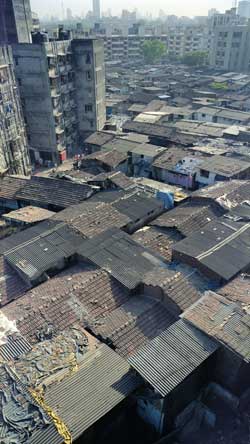SWEDISH SOUTH ASIAN STUDIES NETWORK
conferences
Important lectures/seminars in Scandinavia/Nordic countries
Conferences and workshops
|
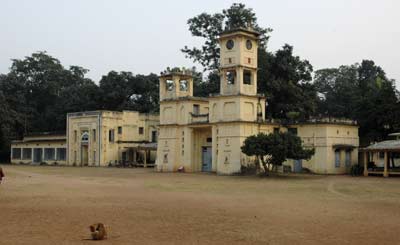 |
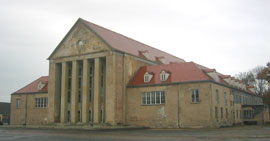 |
• The Seminar for South Asian Studies at Humboldt University in Berlin, Germany, organises an international conference entitled ”Shantiniketan-Hellerau: Universalist Education in the Pedagogical Province“ on 7– 8 October 2011. The conference is held in commemoration of the 150th birth anniversary of Rabindranath Tagore (1861-1941).
In 1908-09 the factory owner Karl Schmidt founded the garden city of Hellerau, today a suburb of Dresden, in Germany. The ideological founders of the garden cities called for a move away from the urban towards the rural where one could live a life that was healthier and closer to nature.
Scarcely ten years earlier in 1901, Rabindranath Tagore, who went on to receive the Nobel Prize for Literature in 1913, had founded the ashram school “Shantiniketan” or “abode of peace” near the village of Bolpur, around 150 km north of Calcutta. Here, far removed from the noise and “vice” of the large city, he envisioned the pupils learning and being taught in the spirit of a new life-centered education.
Appraising these evidently similar developments, the question arises how deep the reciprocal relationship between the cultural institutions was and in what way they actually influenced each other.
This conference hopes to bring together scholars who are interested in taking up some of these questions.
More information. ![]()
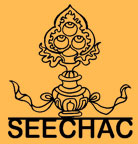 • The Paris based European Society For Studies Of Central Asia and Himalayan Regions (SEECHAC) organises its second international Colloquium on Politics and religions in the
Himalayas and Central Asia in Rome, Italy on 10–11 October 2011. The theme for the 2011 Coloquium is ”The political and
religious expression of sovereignty in the Himalayas
and Central Asia: rituals, texts, representations and institutions
from antiquity till now”. Every SEECHAC member may attend the sessions. The papers may be delivered and written in any European language, preferably in English, Italian or French. Venue for the conference: Museo Nazionale d’Arte Orientale, Rome. More information.
• The Paris based European Society For Studies Of Central Asia and Himalayan Regions (SEECHAC) organises its second international Colloquium on Politics and religions in the
Himalayas and Central Asia in Rome, Italy on 10–11 October 2011. The theme for the 2011 Coloquium is ”The political and
religious expression of sovereignty in the Himalayas
and Central Asia: rituals, texts, representations and institutions
from antiquity till now”. Every SEECHAC member may attend the sessions. The papers may be delivered and written in any European language, preferably in English, Italian or French. Venue for the conference: Museo Nazionale d’Arte Orientale, Rome. More information. ![]()
 • The United Nations Research Institute for Social Development (UNRISD) organizes the ”Green Economy and Sustainable Development Conference: Bringing Back the Social Dimension” in Geneva, Switzerland on 10–11 October 2011. This conference will critically examine a range of issues and questions related to social impacts and distributional consequences of policies and processes associated with green economy; the potential and limits of structural and institutional change; and agency and social mobilization for institutional and policy change. UNRISD invites abstracts that address these cross-cutting themes, as well as abstracts that contribute to the broader conceptualization of the social dimensions of green economy and sustainable development. Registration is online only, and is open from 1 August to 1 September 2011. More information.
• The United Nations Research Institute for Social Development (UNRISD) organizes the ”Green Economy and Sustainable Development Conference: Bringing Back the Social Dimension” in Geneva, Switzerland on 10–11 October 2011. This conference will critically examine a range of issues and questions related to social impacts and distributional consequences of policies and processes associated with green economy; the potential and limits of structural and institutional change; and agency and social mobilization for institutional and policy change. UNRISD invites abstracts that address these cross-cutting themes, as well as abstracts that contribute to the broader conceptualization of the social dimensions of green economy and sustainable development. Registration is online only, and is open from 1 August to 1 September 2011. More information. ![]()
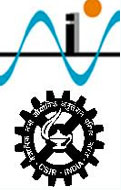 • The 7th International Conference on Asian Marine Geology (ICAMG) will be held from 11 to 14 October 2011 in Goa, India. The first ICAMG was held in Shanghai, China in 1988. So far six ICAMG's have been held in various cities of Asia to promote exchange of ideas and new information on Asian Marine Geology. This is the first ICAMG conference being held in South Asia. All previous ICAMG’s have provided excellent good opportunities for scientist to meet and exchange ideas and share information and to plan for new collaborations. Abstracts should be submitted before 31 July 2011.
• The 7th International Conference on Asian Marine Geology (ICAMG) will be held from 11 to 14 October 2011 in Goa, India. The first ICAMG was held in Shanghai, China in 1988. So far six ICAMG's have been held in various cities of Asia to promote exchange of ideas and new information on Asian Marine Geology. This is the first ICAMG conference being held in South Asia. All previous ICAMG’s have provided excellent good opportunities for scientist to meet and exchange ideas and share information and to plan for new collaborations. Abstracts should be submitted before 31 July 2011.
More information. ![]()
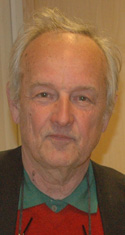 One of the sessions, No 3, focuses on the issue of ”The Illusive Sea Level Threat in the Indian Ocean”, and is convened by Prof. Emeritus Nils-Axel Mörner, Stockholm (previsusly at the Unit of Palegeophysics and Geodynamics, Stockholm University). It will be devoted to observational facts regarding sea level changes, the possible driving forces in climate, the behaviour of glaciers and where to direct the limelight with respect to urgent human problems. The session will most probably be followed by a field trip to one of the islands in the Indian union territory Lakshadweep (Lackadive Islands).
One of the sessions, No 3, focuses on the issue of ”The Illusive Sea Level Threat in the Indian Ocean”, and is convened by Prof. Emeritus Nils-Axel Mörner, Stockholm (previsusly at the Unit of Palegeophysics and Geodynamics, Stockholm University). It will be devoted to observational facts regarding sea level changes, the possible driving forces in climate, the behaviour of glaciers and where to direct the limelight with respect to urgent human problems. The session will most probably be followed by a field trip to one of the islands in the Indian union territory Lakshadweep (Lackadive Islands). ![]()
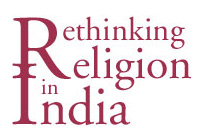 • The third conference on ”Rethinking Religion in India” will be organised in Pardubice in the Czech Republic, 11–14 October 2011. It is part of a series of conferences on this topic carried out during a period of five years by a Indo-European research cluster entitled ”Rethinking Religion in India: European
Representations and Indian Responses”.
• The third conference on ”Rethinking Religion in India” will be organised in Pardubice in the Czech Republic, 11–14 October 2011. It is part of a series of conferences on this topic carried out during a period of five years by a Indo-European research cluster entitled ”Rethinking Religion in India: European
Representations and Indian Responses”.
It is jointly organised by the Research Centre Vergelijkende Cultuurwetenschap, and the India Platform UGent at Ghent University, Belgium; the Centre for the Study of Local Cultures, Kuvempu University, India; and the Karnataka Academy of Social Sciences and Humanities, India. The third conference is organised in collaboration with the Department for the Study of Religions at University of Pardubice, Czech Republic. A call for papers for the Parallel Paper Sessions is open on the
following themes: –The colonial construction of Hinduism; – The caste system and Indian religion; – Secularism in Europe and India; – Said and Orientalism: dead or alive?; – European representations of India; – What does the modernization of Indian traditions mean?; and – Islamic mysticism in European and Indian perspective. Deadline for submissions of abstracts and proposals is June 15th, 2011. More information.
• A one-day conference on ”Afghanistan and the English-Speaking World since 1979: from the Cold War to the Global War on Terror” will be held in Paris on Friday 14 October 2011. It aims to examine the evolution of policy by the English-speaking nations – especially Britain and the U.S. – towards Afghanistan in the period since 1979. Topics under consideration include Afghanistan’s role in the Cold War; American and British relations with post-Soviet Afghanistan, in particular with the Taliban; and War on Terror: the English-speaking nations and Afghanistan since 11 September. Papers on other subjects will however also be considered. Proposals should be sent by 1 March 2011. The conference will be at the University of Paris VIII (University of Vincennes in Saint-Denis), and is sponsored by the research group Frontières et politique étrangère dans le monde Anglophone (FRONTS) at Paris VIII. Papers may be either in French or English. More information. ![]()
 • The 40th Annual Madison Conference on South Asia will be held 20 – 23 October 2011. The conference, that is sponsored by the Center for South Asia at the University of Wisconsin-Madison, attracts over 650 scholars and specialists on South Asia, who travel from countries all over the world and much of the United States. It is a great venue for intellectual, professional, and social exchange. Panels, roundtables, and individual papers on all topics pertaining to South Asian studies are welcome. Registration and proposal submission forms (single papers, panels, roundtables, preconferences) are available on line. Registration as a non-presenting participant at the Conference is open to the general public. The conference features nearly 100 academic panels and roundtables, as well as association meetings and special events ranging from performances to film screenings. Deadline for registration is 1 April 2011. Venue: Madison Concourse Hotel, 1 West Dayton St., Madison, Wisconsin, USA. More information.
• The 40th Annual Madison Conference on South Asia will be held 20 – 23 October 2011. The conference, that is sponsored by the Center for South Asia at the University of Wisconsin-Madison, attracts over 650 scholars and specialists on South Asia, who travel from countries all over the world and much of the United States. It is a great venue for intellectual, professional, and social exchange. Panels, roundtables, and individual papers on all topics pertaining to South Asian studies are welcome. Registration and proposal submission forms (single papers, panels, roundtables, preconferences) are available on line. Registration as a non-presenting participant at the Conference is open to the general public. The conference features nearly 100 academic panels and roundtables, as well as association meetings and special events ranging from performances to film screenings. Deadline for registration is 1 April 2011. Venue: Madison Concourse Hotel, 1 West Dayton St., Madison, Wisconsin, USA. More information. ![]()
 • A conference entitled ”Protecting the Health of the Poor: Social Movements in the South” is held in New Delhi, India 21–23 October 2011. It is being organised by the University of Bergen based Comparative Research Programme on Poverty (CROP); Academics Stand Against Poverty (ASAP); Research and Information System for Developing Countries (RIS); Incentives for Global Health (IGH); and the Developing Countries Research Centre, University of Delhi. The workshop will bring together a maximum of 25 participants across different disciplines and kinds of social movements. It will constitute a unique opportunity to generate a critical and fruitful dialogue among academics and social entrepreneurs about how we can better work with poor people toward protecting their health. More information.
• A conference entitled ”Protecting the Health of the Poor: Social Movements in the South” is held in New Delhi, India 21–23 October 2011. It is being organised by the University of Bergen based Comparative Research Programme on Poverty (CROP); Academics Stand Against Poverty (ASAP); Research and Information System for Developing Countries (RIS); Incentives for Global Health (IGH); and the Developing Countries Research Centre, University of Delhi. The workshop will bring together a maximum of 25 participants across different disciplines and kinds of social movements. It will constitute a unique opportunity to generate a critical and fruitful dialogue among academics and social entrepreneurs about how we can better work with poor people toward protecting their health. More information. ![]()
 • The First Association for Nepal and Himalayan Studies (ANHS) Himalayan Studies Conference will be held at Macalester
College in Saint Paul, Minnesota, USA, in conjunction with the 60th Annual
Midwest Conference on Asian Affairs, 28–30 October 2011. The
theme of the conference will be ”Rethinking the Himalaya: The Indo-Tibetan Interface and Beyond”. The conference marks ANHS’ new
relationship with the Council of American Overseas Research Centers as a
Center in Developing Status. Deadline for submitting abstracts is 1 June 2011. More information.
• The First Association for Nepal and Himalayan Studies (ANHS) Himalayan Studies Conference will be held at Macalester
College in Saint Paul, Minnesota, USA, in conjunction with the 60th Annual
Midwest Conference on Asian Affairs, 28–30 October 2011. The
theme of the conference will be ”Rethinking the Himalaya: The Indo-Tibetan Interface and Beyond”. The conference marks ANHS’ new
relationship with the Council of American Overseas Research Centers as a
Center in Developing Status. Deadline for submitting abstracts is 1 June 2011. More information. ![]()
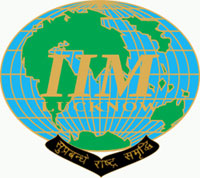 • The 17th International Euro-Asia Research Conference will be held in New Delhi, India, 28–29 October 2011. The theme for the conference will be ”Global Networking and its Implications for Euro-Asia Business Management and Research”. Following a number of conferences held in France, Ireland, Norway, Japan, China, Spain and Indonesia since 1994, the Seventeenth International Euro-Asia Research Conference intends to bring together researchers engaged in Management, Economics and related fields from Europe, Asia and other parts of the World. Doctoral students are also strongly encouraged to submit papers for consideration.
• The 17th International Euro-Asia Research Conference will be held in New Delhi, India, 28–29 October 2011. The theme for the conference will be ”Global Networking and its Implications for Euro-Asia Business Management and Research”. Following a number of conferences held in France, Ireland, Norway, Japan, China, Spain and Indonesia since 1994, the Seventeenth International Euro-Asia Research Conference intends to bring together researchers engaged in Management, Economics and related fields from Europe, Asia and other parts of the World. Doctoral students are also strongly encouraged to submit papers for consideration.
The research conference is a joint undertaking between the Indian Institute of Management (IIM), Lucknow, India; Yokohama National University, Japan; University of Poitiers, University of Pau, and TELECOM Ecole de Management, France; School of East Asian Studies, University of Sheffield, UK; and University of Limerick, Ireland. The conference hosted by IIM Lucknow at its Noida campus, outside New Delhi.
Abstracts should be submitted before 31 March 2011. More information. ![]()
November 2011
An international conference on "Asian Encounters: Networks of Cultural Interaction" will take place in New Delhi, 1-3 November 2011. It is being organised by the IIC-Asia Project and the Dept. of History at the University of Delhi and it will explore the cultural interactions on the Asian continent in pre-modern times. Primary topics of the conference will be: - Historical contexts and avenues of cultural interaction; - Aesthetic theories and praxis; - Religious and cultural matrices of artistic and literary discourse; - Art, religion, and literature: inter-relationships, transmission and
transformation of the narrative, iconic, and built traditions; - The artist and the creative process; context, patronage, and reception of art; - The past in the present: museums of Asian art; archaeological and
conservation practices. More information.![]()
• A two-day conference on ”CinemaSpace: Indian Cinema and the City” will be held in Houston, Texas, USA, 3–4 November 2011. It is organised by the Chao
Center
for
Asian
Studies at
Rice
University in Houston. CinemaSpace intends to bring together scholars working on Indian cinema in an attempt to refocus our attention on question of technology, aesthetics and the production of cinematic space. The structuring of the cinematic city will be the organizing thread of the conference. The city here is understood as a placeholder for bringing together and delineating concerns of aesthetics, technology, modernity and development. Professor Moinak Biswas, Department of Film Studies, Jadavpur University, Kolkata (India) will give the keynote address. More information. ![]()
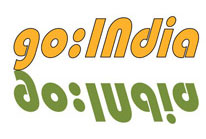 • An International Indo-Swedish Seminar on ”Practice-based Knowledge in the 21st Century” will be held in Varanasi, India, 14–16 November 2011. It is being organized by the Dept. of Philosophy & Religion, Faculty of Arts at Banaras Hindu University (BHU), under the auspices of the BHU-Gothenburg University collaboration within the GO:India programme. The aim of this conference is to see and reflect on new sides of the social worlds
and the social and humanistic sciences in India and Sweden using the perspectives of
practice based knowledge developed within social work, religious work, health care as
well as in the arts and philosophy, in order to identify and generate new interesting
platforms for academic cooperation. Abstracts should be submitted before 15 September 2011. More information.
• An International Indo-Swedish Seminar on ”Practice-based Knowledge in the 21st Century” will be held in Varanasi, India, 14–16 November 2011. It is being organized by the Dept. of Philosophy & Religion, Faculty of Arts at Banaras Hindu University (BHU), under the auspices of the BHU-Gothenburg University collaboration within the GO:India programme. The aim of this conference is to see and reflect on new sides of the social worlds
and the social and humanistic sciences in India and Sweden using the perspectives of
practice based knowledge developed within social work, religious work, health care as
well as in the arts and philosophy, in order to identify and generate new interesting
platforms for academic cooperation. Abstracts should be submitted before 15 September 2011. More information. ![]()
• The Comparative Education Society of India (CESI) invites participants to its Annual
International Conference 2011 to be held in Hyderabad, India 16–18 November 2011. It is being organised under the auspices of the Dept. of Sociology, University of
Hyderabad. Scholars of South Asia who are working on the issues related to education are encouraged to send their abstracts. The theme of the 2011 conference is 'Rethinking Education Policy'. An attempt will be
made to discuss and debate education policy in its entirety from
a comparative perspective. The Conference is expected to bring
educationists, social scientists, policy makers and practitioners
together to deliberate various aspects of the dynamics of
education policy and its making and processes. More information. ![]()
 • A conference on
'Structures of Exclusion in South Asia' will be held at
University of Delhi, 23 – 25 November 2011. It is organised by the Indian Formation
Research Society as an interdisciplinary and politically independent gathering. It builds upon the previous
conferences on 'Culture, Politics & Economics of South Asian Migration' (2010), 'Region
Formation in Contemporary South Asia' (2009) and 'The Character & Trajectory of the Indian
Economic Formation in an Era of Globalisation' (2008).
• A conference on
'Structures of Exclusion in South Asia' will be held at
University of Delhi, 23 – 25 November 2011. It is organised by the Indian Formation
Research Society as an interdisciplinary and politically independent gathering. It builds upon the previous
conferences on 'Culture, Politics & Economics of South Asian Migration' (2010), 'Region
Formation in Contemporary South Asia' (2009) and 'The Character & Trajectory of the Indian
Economic Formation in an Era of Globalisation' (2008).
The conference deals with the well-known existence of institutionalised exclusion in South Asia:
social, economic,
political and cultural inequities typically defining the corpus identity of academic South Asian
studies. Yet, the research area is actually seriously undertheorised.
As compared to other Third World societies, state formations in South Asia have certain
similarities, and some unique traits.
Interested scholars should submit their affiliation, paper
title and one page abstract to the conference committee before
30th September 2011. Full information about the conference. ![]()
 • The Spanish Association for Interdisciplinary India Studies (AEEII) organises its second international conference, entitled ”‘Other’ Indias: The Richness of Indian Multiplicity” on 23–26
November 2011. The conference will be hosted by the University of La Laguna (Facultad de Filolog’a & Dept of English and German Studies) at the Canary Island of Tenerife, Spain. 23-26, 2011: Universidad de La Laguna, Tenerife, Canaries, Spain. Papers from a variety of fields (including politics, literary criticism, sociology, philosophy, history, ecology, anthropology, technology, economics, and others) which consider the multiplicity of the Indian mosaic are welcome. Proposals that look into the ways in which India (and the Indian subcontinent) is represented and explored, with special emphasis on difference in plurality, and diversity in unity is especially invited. Complete affiliation of author(s), and paper title, as well as telephone, fax, mail and e-mail addresses, should be submitted before June 30, 2011. More information.
• The Spanish Association for Interdisciplinary India Studies (AEEII) organises its second international conference, entitled ”‘Other’ Indias: The Richness of Indian Multiplicity” on 23–26
November 2011. The conference will be hosted by the University of La Laguna (Facultad de Filolog’a & Dept of English and German Studies) at the Canary Island of Tenerife, Spain. 23-26, 2011: Universidad de La Laguna, Tenerife, Canaries, Spain. Papers from a variety of fields (including politics, literary criticism, sociology, philosophy, history, ecology, anthropology, technology, economics, and others) which consider the multiplicity of the Indian mosaic are welcome. Proposals that look into the ways in which India (and the Indian subcontinent) is represented and explored, with special emphasis on difference in plurality, and diversity in unity is especially invited. Complete affiliation of author(s), and paper title, as well as telephone, fax, mail and e-mail addresses, should be submitted before June 30, 2011. More information. ![]()
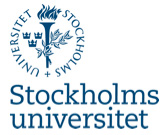 |
 |
• Forum for Asian Studies at Stockholm University and the Nordic Institute for Asian Studies (NIAS) in Copenhagen jointly arrange the
5th Annual Nordic NIAS Council Conference & PhD Course in Stockholm on 21–25 November 2011. The theme for the 2011 event is ”Political regimes, growth politics and conflict in Asia. Responses to changing environmental, economic and socio-cultural conditions in Asia”. The primary focus of the conference is the responses to these ongoing socio-economic, cultural, economic and environmental changes in Asia. In what ways are changes being interpreted by actors in Asian societies? What are the nature and implications of the encounters produced by these recent changes? Conference participation is open to all scholars and graduate students. As this is an interdisciplinary conference we especially encourage contributions from all social science disciplines as well as interdisciplinary perspectives. Abstracts should be submitted before 1 October 2011.
The conference will be combined with workshop activities where doctoral candidates may present and discuss their research projects with senior researchers as well as other fellow doctoral candidates. The first two days will be devoted to panels and keynote speakers while the last two days will focus on workshops for doctoral students. The conference/workshop can be taken as a 7.5 ECTS credit course. More information. ![]()
• The European Studies Programme at The University of Delhi, India is holding a conference on ”Thinking Europe/Thinking India” on 23–25 November 2011 at Delhi. Abstracts are invited for a transdisciplinary session on 'Visual Culture' that will focus on visuality in Europe and/or India. The deadline for abstracts is September 15, 2011. More information. ![]()
 • A Nordic conference on 'Future of Development Research: Exploring the Nordic perspective(s)?' will be held in Copenhagen, Denmark, 24–25 November 2011. It is jointly organised by the Dag Hammarskjöld Foundation in Uppsala; the Nordic Africa Institute in Uppsala, the Finnish Society for Development Research (FSDR), the Norwegian Association of Development Researchers (NFU), and the Association of Development Researchers in Denmark (FAU). A number of Nordic institutions working in the field of development research are also involved, in Sweden the School of Global Studies & Gothenburg Centre for Globalization and Development, both at Gothenburg University.
Venue for the conference: Copenhagen Business School (CBS), Dalgas Have, Copenhagen.
• A Nordic conference on 'Future of Development Research: Exploring the Nordic perspective(s)?' will be held in Copenhagen, Denmark, 24–25 November 2011. It is jointly organised by the Dag Hammarskjöld Foundation in Uppsala; the Nordic Africa Institute in Uppsala, the Finnish Society for Development Research (FSDR), the Norwegian Association of Development Researchers (NFU), and the Association of Development Researchers in Denmark (FAU). A number of Nordic institutions working in the field of development research are also involved, in Sweden the School of Global Studies & Gothenburg Centre for Globalization and Development, both at Gothenburg University.
Venue for the conference: Copenhagen Business School (CBS), Dalgas Have, Copenhagen.
Conference information by FAU, or by NFU
 The theme of the conference’s workshop no. 9 is ”Nordic Perspectives on South Asian Development”. The workshop is organised by
Kenneth Bo Nielsen, Centre for Development and the Environment, University of Oslo;
Dayabati Roy, Dept. of Cross-Cultural and Regional Studies, University of Copenhagen; and Annika Wetlesen, Dept. of Sociology and Human Geography, University of Oslo. Deadline for submitting abstract has been extended to 15 August 2011. Please send them to fau@diis.dk, and NOT to the workshop organisers. Hopefully many among the Nordic South Asianist community will extend their full support to this rare pan-Nordic initiative and come to Copenhagen in November.
The theme of the conference’s workshop no. 9 is ”Nordic Perspectives on South Asian Development”. The workshop is organised by
Kenneth Bo Nielsen, Centre for Development and the Environment, University of Oslo;
Dayabati Roy, Dept. of Cross-Cultural and Regional Studies, University of Copenhagen; and Annika Wetlesen, Dept. of Sociology and Human Geography, University of Oslo. Deadline for submitting abstract has been extended to 15 August 2011. Please send them to fau@diis.dk, and NOT to the workshop organisers. Hopefully many among the Nordic South Asianist community will extend their full support to this rare pan-Nordic initiative and come to Copenhagen in November.
See the call for papers for the South Asia workshop. ![]()
University of Oslo has decided to merge its annual contemporary India seminar this year with the joint Nordic conference on development research in Copenhagen and its workshop no. 9. At the same time broadening the focus for the seminar somewhat, opening up for contributions that focus on other parts of South Asia as well. ![]()
 • The Department of Sociology at the University of Oxford organises a conference on South Asia in Transition to be held 25-26 November 2011. Its aim is to explore and capture the social, political, economic and cultural transformations that have taken place in India, Pakistan, Bangladesh, Nepal, Sri Lanka, Bhutan, Afghanistan and Maldives in the past twenty years. The primary panels will encompass the following themes: - Political Participation: Democracy, Dictatorship and Beyond; - Transformations in Political Economy: State, Capital and Changing Labour Relations; - Politics of Resistance: Social Movement and Violent Conflicts; - Social Exclusion and the Minority Question; - The South Asian Diaspora: The Politics of Conflict, Identity and Change; - Reaching 'the poor': Towards Multidimensional Poverty Eradication Throughout South Asia. Papers from younger researchers are welcome and should be submitted before 15 August 2011. More information.
• The Department of Sociology at the University of Oxford organises a conference on South Asia in Transition to be held 25-26 November 2011. Its aim is to explore and capture the social, political, economic and cultural transformations that have taken place in India, Pakistan, Bangladesh, Nepal, Sri Lanka, Bhutan, Afghanistan and Maldives in the past twenty years. The primary panels will encompass the following themes: - Political Participation: Democracy, Dictatorship and Beyond; - Transformations in Political Economy: State, Capital and Changing Labour Relations; - Politics of Resistance: Social Movement and Violent Conflicts; - Social Exclusion and the Minority Question; - The South Asian Diaspora: The Politics of Conflict, Identity and Change; - Reaching 'the poor': Towards Multidimensional Poverty Eradication Throughout South Asia. Papers from younger researchers are welcome and should be submitted before 15 August 2011. More information. ![]()
• The Center for South and Southeast Asian Studies, University of Calcutta in Kolkata, India organizes an International seminar on ”Conflict, Terrorism and Resolution: The South Asian Scenario” on 26 November 2011. The event will be attended by foreign delegates from SAARC and Southeast Asian countries, including, scholars, experts and academicians from India. The Seminar is aimed at providing an interactive platform for sharing of expertise and experience between India and other South Asian countries which are severely affected by the scourge of terrorism and militancy. Keeping the annihilation of founder-figures of terrorist organization, the al-Qaeda and the LTTE in mind, the deliberations of the seminar is an attempt to examine the security situation of the region, the law enforcement mechanisms and cooperation amongst global/regional organizations to fight the scourge of terrorism in the most volatile region of the world.
Among the sessions, one focuses on ”Future of Terrorism in South Asia”, chaired by Prof. Purusottam Bhattacharya, Jadavpur University; another on ”The Internal Dynamics of Militancy, Conflict and Separatism in South Asia”, chaired by Prof. Rajagopal Dhar Chakraborti, Calcutta University; and a third on ”Counter-Terrorism Cooperation in Fighting the Malaise of Terrorism in South Asia”, chaired by Prof. Swapna Bhattacharya Chakraborti, Calcutta University. ![]()
 • The Institute of Social and Policy Sciences (I-SAPS) in Islamabad, Pakistan invites papers for the
first annual Colloquium on ”Public Action in Pakistan: Vacillating between
Apathy and Anger” to be held 27–28 November 2011. The Colloquium is first in the series of annual
multi-disciplinary colloquia which will allow different social sciences
perspectives leverage and enrich each other. Beyond its scholarly goals,
the organisers hope that the Colloquium would inform the debates on public policy and
development agenda in Pakistan. I-SAPS is inviting scholars in local as well as international academia to
discuss the difficulties in dealing with social change especially in
developing and Muslim societies like Pakistan from multi-disciplinary
aspects, with special reference to individual’s personal behavior and its
relation to societal changes. More information.
• The Institute of Social and Policy Sciences (I-SAPS) in Islamabad, Pakistan invites papers for the
first annual Colloquium on ”Public Action in Pakistan: Vacillating between
Apathy and Anger” to be held 27–28 November 2011. The Colloquium is first in the series of annual
multi-disciplinary colloquia which will allow different social sciences
perspectives leverage and enrich each other. Beyond its scholarly goals,
the organisers hope that the Colloquium would inform the debates on public policy and
development agenda in Pakistan. I-SAPS is inviting scholars in local as well as international academia to
discuss the difficulties in dealing with social change especially in
developing and Muslim societies like Pakistan from multi-disciplinary
aspects, with special reference to individual’s personal behavior and its
relation to societal changes. More information. ![]()
December 2011
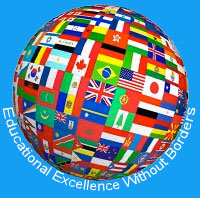 • The Indus Foundation, a non-profit making educational organization dedicated to the promotion of higher education in India, organises the third annual Indo-Global Education Summit in New Delhi, Bangalore, and Mumbai, India, 4–12 December 2011. The Summit 2011 will have sessions on collaborative research programs, joint undergraduate and graduate programs, twinning & transfer programs, distance education programs, faculty & student exchange programs, study abroad in India programs, and other academic partnerships. The major fields covered would be Engineering & IT, Business & Management, Life Sciences & Biomedicine, Natural Sciences, Arts & Humanities, and Social Sciences. There will be one-on-one meetings between representatives of Indian institutions and those of foreign universities. for forging academic collaborations. The Summit 2011 is specifically designed for university vice-chancellors, presidents, provosts, deans, enrollment / recruitment officers, and their executive-level team members. Early registration is strongly suggested.
• The Indus Foundation, a non-profit making educational organization dedicated to the promotion of higher education in India, organises the third annual Indo-Global Education Summit in New Delhi, Bangalore, and Mumbai, India, 4–12 December 2011. The Summit 2011 will have sessions on collaborative research programs, joint undergraduate and graduate programs, twinning & transfer programs, distance education programs, faculty & student exchange programs, study abroad in India programs, and other academic partnerships. The major fields covered would be Engineering & IT, Business & Management, Life Sciences & Biomedicine, Natural Sciences, Arts & Humanities, and Social Sciences. There will be one-on-one meetings between representatives of Indian institutions and those of foreign universities. for forging academic collaborations. The Summit 2011 is specifically designed for university vice-chancellors, presidents, provosts, deans, enrollment / recruitment officers, and their executive-level team members. Early registration is strongly suggested.
More information about the Indo-Global Education Summit 2011. ![]()
The US-based Indus Foundation has a network of offices in India covering the major cities including Ahmedabad, Amritsar, Bangalore, Chandigarh, Chennai, Eluru, Hyderabad, Jaipur, Jallandhar, Kakinada, Kanpur, Kochi, Kolkata, Ludhiana, Lucknow, Meerut, Mehsana, Nagpur, Nashik, New Delhi, Noida, Panchkula, Pilibhit, Pune, Sambalpur, Surat, Thane, Trivandrum, Udaipur, Vadodara, Vallabh Vidyanagar, Vijayawada, and Visakhapatnam. Over the years, the Foundation has emerged as a leading recruiter of well-qualified and financially able Indian students for study in foreign universities.
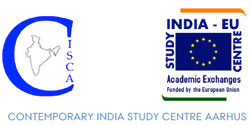 •
The Contemporary India Study Centre Aarhus (CISCA), and the Dept. of History and Area Studies at Aarhus
University, Denmark host a set of two workshops on Visual Cultures in Contemporary India, in collaboration with Sri Venkateswara College at Delhi University in India. The first workshop will be held at Aarhus
•
The Contemporary India Study Centre Aarhus (CISCA), and the Dept. of History and Area Studies at Aarhus
University, Denmark host a set of two workshops on Visual Cultures in Contemporary India, in collaboration with Sri Venkateswara College at Delhi University in India. The first workshop will be held at Aarhus
University on 8–9 December 2011, while the second one will be located at Sri Venkateswara College a month later, 8–9 January 2012. ![]()
The first workshop is reserved for a broader mapping of this multi-facetted and dynamic field with its diverse
traditions and innovative potential in India and South Asia. Thus, the workshop focuses on the development of
various media, but also on the motives, strategies and approaches of the producers as well as consumers – exploring visual cultures in relation to themes such as nationalism; gender, family and kin; urban and rural
images, religion or diaspora and transnational flows.
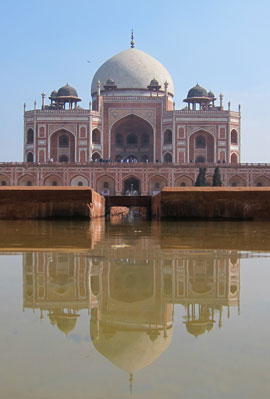 Delhi became the capital of a north Indian empire in 13th century and – with some exceptions – remained a
capital most of the later years. In general, India had many phases of strong urbanity and urban cultures, right from Harappan civilization to modern New Delhi. And with New Delhi completing its century in 2011, it may be
a fitting tribute to hold the second workshop on how Delhi has been seen in visual cultures over the centuries.
Delhi became the capital of a north Indian empire in 13th century and – with some exceptions – remained a
capital most of the later years. In general, India had many phases of strong urbanity and urban cultures, right from Harappan civilization to modern New Delhi. And with New Delhi completing its century in 2011, it may be
a fitting tribute to hold the second workshop on how Delhi has been seen in visual cultures over the centuries.
Thus, the organisers would like to commemorate, analyse and document the visual past of Delhi and, more broadly, urban
India and wish to explore and document how Delhi has been seen and portrayed in various forms of visual
cultures.
Proposals are invited for either one of them from scholars who have worked on relevant areas. Though both workshops are organized jointly individual contributionsare most welcome to one or the
other.
Deadlines for submitting abstracts are 31 August 2011 (Aarhus workshop), and
30 2011 September (Delhi workshop).
Full information about the CISCA workshops. ![]()
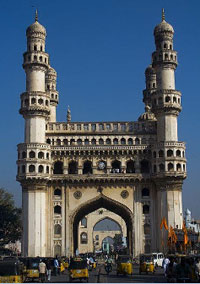 The 11th Asian Urbanization International Conference will be held in Hyderabad, India, 10 – 13 December 2011. It is being hosted by the Dept. of Geography at Osmania University, in association with The Asian Urban Research Association (AURA). AURA was established in January 1986 and is housed in the University of Akron, Ohio, USA. It is a non profit and private research organization whose primary purpose is to promote the study of urbanization, urban growth and to organize Asian Urbanization Conferences. The first Asian Urbanization Conference was held at the University of Akron in 1985. The conferences are biennial (held every other/alternate year) and have resulted in many publications. Deadline for submitting abstracts is 30 March 2011. More information.
The 11th Asian Urbanization International Conference will be held in Hyderabad, India, 10 – 13 December 2011. It is being hosted by the Dept. of Geography at Osmania University, in association with The Asian Urban Research Association (AURA). AURA was established in January 1986 and is housed in the University of Akron, Ohio, USA. It is a non profit and private research organization whose primary purpose is to promote the study of urbanization, urban growth and to organize Asian Urbanization Conferences. The first Asian Urbanization Conference was held at the University of Akron in 1985. The conferences are biennial (held every other/alternate year) and have resulted in many publications. Deadline for submitting abstracts is 30 March 2011. More information. ![]()
• The fifth International Seminar and Workshop on Fermented Foods Health Status and Social Wellbeing will be organised by SASNET – Fermented Foods at the Central Food Technological Research Institute (CFTRI) in Mysore, India on 15th and 16th of December 2011. SASNET Fermented Foods is a forum for scientists of the south Asian countries, Sweden and other countries for exchanging information in the field of food fermentation and its practical application. It was launched in 2003 by Prof. Baboo Nair, Division of Applied Nutrition and Food Chemistry, Lund University.
For more details around the 2011 workshop, please contact the organising secretary, Dr. G. Vijayalekshmi, Deputy Director, Food Microbiology Department, CFTRI. More information about SASNET Fermented Foods. ![]()
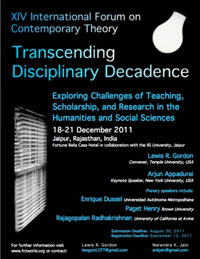 • The 14th International Forum on Contemporary Theory will be held in Jaipur, Rajasthan, India 18-21 December 2011. The main topic this year is ”Transcending Disciplinary Decadence” and will aim at exploring challenges in front of the social sciences, humanities and scholarship in these fields today, from the perspectives of globalisation, market considerations and neoliberal university policies, as well as the so called ”colonialisation” of knowledge. Keynote speaker opening the conference will be the renowned Prof. Arjun Appadurai from New York University. The traditional special plenary session on a regional text will this year be dedicated to the famous modern Hindi-Urdu modernist Munshi Premchand's and his novel Godan (1936), known in English as ”The Gift of a Cow”. Submission of abstracts for the panels is open until 30 August 2011 and should be sent to the convener of the conference, Lewis Gordon at lewgord.CFT@gmail.com.
• The 14th International Forum on Contemporary Theory will be held in Jaipur, Rajasthan, India 18-21 December 2011. The main topic this year is ”Transcending Disciplinary Decadence” and will aim at exploring challenges in front of the social sciences, humanities and scholarship in these fields today, from the perspectives of globalisation, market considerations and neoliberal university policies, as well as the so called ”colonialisation” of knowledge. Keynote speaker opening the conference will be the renowned Prof. Arjun Appadurai from New York University. The traditional special plenary session on a regional text will this year be dedicated to the famous modern Hindi-Urdu modernist Munshi Premchand's and his novel Godan (1936), known in English as ”The Gift of a Cow”. Submission of abstracts for the panels is open until 30 August 2011 and should be sent to the convener of the conference, Lewis Gordon at lewgord.CFT@gmail.com.
More information.![]()
• An interdisciplinary conference on "Cultural Transformations: Development Initiatives and Social Movements" will be held in Dhaka, Bangladesh on 17 - 18 December 2011. The conference is organised by the Dept. of English and Humanities and BRAC Development Institute at BRAC University and will aim at gathering local and international academics and practitioners to problematise the idea of Asia. A call for papers is open and submissions are accepted by 31 May 2011. The submitted papers should focus on some of the following topics: - Social movements and struggles;- Development initiatives and cultural change; - Asian feminisms and social change;- The post-colonial, the national and the pan-Asian in the formation of new cultural identities, - Changes and developments in popular cultural practices, including music, dance, film and popular literature. Other topics in Inter-Asia Cultural Studies are also welcome. The organisers will provide for the accommodation of the conferencec participants. More information. ![]()
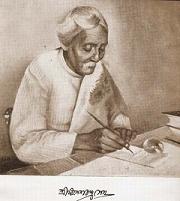 • The 2nd International Congress of Bengal Studies is scheduled to be held 17–19 December, 2011. It will be jointly hosted by the University of Dhaka and Bangla Academy, Dhaka, Bangladesh. The theme of the 2011 Congress is ‘Contemporary Bengal Studies’. Papers on other areas of Bengal Studies, including, but not limited to, Literature and Criticism, Comparative Literature, Linguistics, Folklore, Cultural Studies, Media Studies, History, Economics, Sociology, Fine Arts, Philosophy, Anthropology, Archaeology, Museology are also invited. Papers should be either in Bengali or in English. Paper proposals/abstracts should be submitted before 15 March 2011. More information.
• The 2nd International Congress of Bengal Studies is scheduled to be held 17–19 December, 2011. It will be jointly hosted by the University of Dhaka and Bangla Academy, Dhaka, Bangladesh. The theme of the 2011 Congress is ‘Contemporary Bengal Studies’. Papers on other areas of Bengal Studies, including, but not limited to, Literature and Criticism, Comparative Literature, Linguistics, Folklore, Cultural Studies, Media Studies, History, Economics, Sociology, Fine Arts, Philosophy, Anthropology, Archaeology, Museology are also invited. Papers should be either in Bengali or in English. Paper proposals/abstracts should be submitted before 15 March 2011. More information. ![]()
• An International Interdisciplinary Conference on ”Meaning, Society and Values: East and West” will be held 28-30 December 2011 in Kolkata, India. It is being organized by Dr. Chandana Chakrabarti, Director of the Center for Spirituality, Ethics and Global Awareness, Davis and Elkins College, West Virginia, USA. Abstracts should be submitted by 31 May 2011.
Selected papers from the conference will be published in the Journal of International and Interdisciplinary Studies/Journal of Indian Philosophy and Religion). More information. ![]()
2012
January 2012
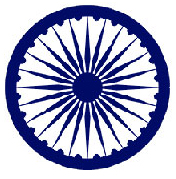 • An International Interdisciplinary Conference on ”Meaning, Culture and Values: East and West” will be held in New Delhi, India, 5-7 January 2012.
It is being organised by the Society of Indian Philosophy and Religion. Subtopics include Ethnic Identity & Culture, Indian Civilization & Society, Role of Culture & Religion, and Cultural Meaning, Buddhism & Postmodernity. Selected papers from the conference will be published in the Journal of International and Interdisciplinary Studies and the Journal of Indian Philosophy and Religion). Advisory board members include Dr. Tommi Lehtonen from University of Vaasa in Finland. Abstracts should be submitted by e-mail to the conference convener Dr. Chandana Chakrabarti, Elon University in North Carolina, USA. More information.
• An International Interdisciplinary Conference on ”Meaning, Culture and Values: East and West” will be held in New Delhi, India, 5-7 January 2012.
It is being organised by the Society of Indian Philosophy and Religion. Subtopics include Ethnic Identity & Culture, Indian Civilization & Society, Role of Culture & Religion, and Cultural Meaning, Buddhism & Postmodernity. Selected papers from the conference will be published in the Journal of International and Interdisciplinary Studies and the Journal of Indian Philosophy and Religion). Advisory board members include Dr. Tommi Lehtonen from University of Vaasa in Finland. Abstracts should be submitted by e-mail to the conference convener Dr. Chandana Chakrabarti, Elon University in North Carolina, USA. More information. ![]()
• The 14th International Maharashtra Conference: Society and Culture will be held in
Mumbai, India 6–8 January 2012. The theme of the conference will be 'Sthalantar'. Sthalantar could be roughly translated in English
as 'migration'. However, the theme for the conference will be more broadly
interpreted and will entail more meanings than mere 'migration'. It will
connote or imply immigration-deshantar, wandering-bhatkanti,
pilgrimage-teerthatan, travel-pravas or paryatan or deshatan. Abstracts shpuld be submitted before 15 May 2011. More information. ![]()
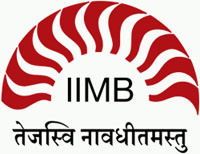 • The Indian Institute of Management Bangalore (IIMB) hosts an international conference on ”The Spiritual Challenge in Management: What is to be Done?” at the IIMB Campus in Bangalore on 9–11 January 2012. The conference is organised in collaboration with the Journal of Management, Spirituality and Religion. It is convened by Prof. Ramnath Narayanswamy, IIMB, and Prof. Yochanan Altman, Bordeaux Management School (BEM), France.
The conference will address and question a key issue of our times: the adequacy of the current paradigms of management for the future of mankind and our planet. The positioning of the conference in India is signaling the issue we are questioning: is the Western model of management the best suited for the challenges we face? What can West and East learn from each other? And how does the new epoch of spirituality fit into these new emerging agendas? More information on the conference web page.
• The Indian Institute of Management Bangalore (IIMB) hosts an international conference on ”The Spiritual Challenge in Management: What is to be Done?” at the IIMB Campus in Bangalore on 9–11 January 2012. The conference is organised in collaboration with the Journal of Management, Spirituality and Religion. It is convened by Prof. Ramnath Narayanswamy, IIMB, and Prof. Yochanan Altman, Bordeaux Management School (BEM), France.
The conference will address and question a key issue of our times: the adequacy of the current paradigms of management for the future of mankind and our planet. The positioning of the conference in India is signaling the issue we are questioning: is the Western model of management the best suited for the challenges we face? What can West and East learn from each other? And how does the new epoch of spirituality fit into these new emerging agendas? More information on the conference web page. ![]()
• The ‘Focus Asia Organisation’ of Kolkata, India convenes an international conference ”Asian Religions & The World” on 23–25 January 2012. The objective is to provide a common platform for the exchange of ideas & views among those,
who are seriously engaged in the study of religions and associated topics. The academic periphery of the upcoming conference includes the growth, evolution and changes of the religions, interactions among them and their role in the modem world particularly in the background of globalization. The ‘Focus Asia Organization’ is a voluntary body, formerly known as “Society for Indian Culture & Heritage”. More information. ![]()
February 2012
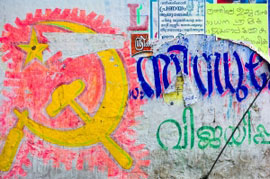 • The Annual Institute of Colonial and Postcolonial Studies (ICPS), University of Leeds) and Postcolonial Studies Association (PSA) Postgraduate Conference will take place 2–3 February 2012 at University of Leeds, UK. The theme for the 2012 conference will be ‘Re-evaluating the Postcolonial City: Production, Reconstruction, Representation’, and is likely to have a strong Asian Studies strand running through it.
• The Annual Institute of Colonial and Postcolonial Studies (ICPS), University of Leeds) and Postcolonial Studies Association (PSA) Postgraduate Conference will take place 2–3 February 2012 at University of Leeds, UK. The theme for the 2012 conference will be ‘Re-evaluating the Postcolonial City: Production, Reconstruction, Representation’, and is likely to have a strong Asian Studies strand running through it.
This conference re-evaluates the postcolonial city-space as a site of cultural production. The postcolonial city has reconfigured itself in literature and culture, as an urban space that incessantly explores its modernity along various, conflicting lines of identity, representation and consumption. The event brings together practicing cultural producers and their critics, early career scholars and postgraduate students working with the subject of the postcolonial city. In order to re-evaluate the impact of the postcolonial city on lives beyond the remit of the academy, the organisers seek to posit the figure of the cultural producer as a primary focus area of our conference. Abstracts should be submitted before 15 September 2011. More information. ![]()
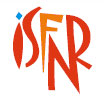 • The Manipur University in collaboration with the International Society for Folk Narrative Research (ISFNR) organize the Belief Narratives International Symposium at Manipur University, Imphal, Manipur from 6-8 February 2012. The International Society for Folk Narrative Research is an international academic body whose objective is “to develop scholarly work in the field of folk narrative research and to stimulate contacts and the exchange of views among its members”. The research interest of ISFNR members around the world includes a number of disciplines in the humanities and social sciences, “covering all aspects of narrative as representing the pivotal category of human communication”.
The Symposium theme will be ”Local Legends in the Global Context”. Deadline for registrations is 30 October 2011. More information.
• The Manipur University in collaboration with the International Society for Folk Narrative Research (ISFNR) organize the Belief Narratives International Symposium at Manipur University, Imphal, Manipur from 6-8 February 2012. The International Society for Folk Narrative Research is an international academic body whose objective is “to develop scholarly work in the field of folk narrative research and to stimulate contacts and the exchange of views among its members”. The research interest of ISFNR members around the world includes a number of disciplines in the humanities and social sciences, “covering all aspects of narrative as representing the pivotal category of human communication”.
The Symposium theme will be ”Local Legends in the Global Context”. Deadline for registrations is 30 October 2011. More information. ![]()
 • The Gujarat Studies Association (GSA) invites to its 4th Biennial Conference to be held 15–16 February 2012 in Dubai, United Arab Emirates. The theme for the conference will be ”The Gujarati Community: Globalisation, Mobility and Belonging”. Keynote speakers are Dr. Farouk Topan from Aga Khan University Institute for the Study of Muslim Civilisations (AKU-ISMC) in London; and Prof. Helene Basu, University of Münster. Deadline for submitting abstracts is 12 September 2011. More information.
• The Gujarat Studies Association (GSA) invites to its 4th Biennial Conference to be held 15–16 February 2012 in Dubai, United Arab Emirates. The theme for the conference will be ”The Gujarati Community: Globalisation, Mobility and Belonging”. Keynote speakers are Dr. Farouk Topan from Aga Khan University Institute for the Study of Muslim Civilisations (AKU-ISMC) in London; and Prof. Helene Basu, University of Münster. Deadline for submitting abstracts is 12 September 2011. More information. ![]()
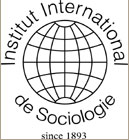 • The 40th World Congress of International Institute of Sociology (IIS) will be held at New Delhi, India 16–19 February 2012. The theme of the conference is ”After Western Hegemony: Social Science and its Publics”. It is jointly sponsored by the Centre for the Study of Developing Societies (CSDS) in Delhi and the Swedish Collegium for Advanced Study (SCAS) in Uppsala. The main organisers are Rajeev Bhargava, Director of CSDS and Björn Wittrock, Principal of the SCAS and President of the IIS. More information about the Delhi conference.
• The 40th World Congress of International Institute of Sociology (IIS) will be held at New Delhi, India 16–19 February 2012. The theme of the conference is ”After Western Hegemony: Social Science and its Publics”. It is jointly sponsored by the Centre for the Study of Developing Societies (CSDS) in Delhi and the Swedish Collegium for Advanced Study (SCAS) in Uppsala. The main organisers are Rajeev Bhargava, Director of CSDS and Björn Wittrock, Principal of the SCAS and President of the IIS. More information about the Delhi conference. ![]()
Among the many panels to be convened at the 40th World Congress, could be mentioned a panel on ”Social Change as the Story of Contemporary Indian Society and Social Scientists as the Story Tellers”, convened by Sailaja Nandigama and Eswarappa Kasi from Wageningen University, Netherlands, and University of Hyderabad, India. More information.
March 2012
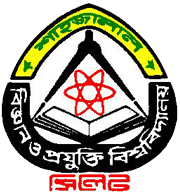 • The 2nd International Conference on Environmental Technology and Construction Engineering for Sustainable Development (ICETCESD 2012) will be held in Sylhet, Bangladesh, 10–12 March 2012. The conference is organized by the Civil and Environmental Engineering Department at Shahjalal University of Science and Technology (SUST). It has been preceded by a successful first conference on the same issue (ICETCESD 2011) that was held in March 2011. More than 100 papers were presented and more than 120 paper were published in the conference proceedings of which more than 50 papers were authorized by the scientists, engineers and specialists coming not only from Bangladesh, but also from USA, Canada, UK, France, Netherlands, Spain, Sweden, Denmark, Italy, Japan, Australia, Thailand, Singapore, India, Nepal, and Afghanistan (see the proceedings from ICETCESD 2011).
• The 2nd International Conference on Environmental Technology and Construction Engineering for Sustainable Development (ICETCESD 2012) will be held in Sylhet, Bangladesh, 10–12 March 2012. The conference is organized by the Civil and Environmental Engineering Department at Shahjalal University of Science and Technology (SUST). It has been preceded by a successful first conference on the same issue (ICETCESD 2011) that was held in March 2011. More than 100 papers were presented and more than 120 paper were published in the conference proceedings of which more than 50 papers were authorized by the scientists, engineers and specialists coming not only from Bangladesh, but also from USA, Canada, UK, France, Netherlands, Spain, Sweden, Denmark, Italy, Japan, Australia, Thailand, Singapore, India, Nepal, and Afghanistan (see the proceedings from ICETCESD 2011).
Papers are now invited for the 2012 conference Deadline for submitting abstracts is 31 October 2011. More information. ![]()
 • The 2012 AAS (American Association for Asian Studies) Annual Meeting will be held 15–18 March 2012 in Toronto, Canada. Founded in 1941, AAS is a scholarly, non-political, non-profit professional association open to all persons interested in Asia. It seeks through publications, meetings, and seminars to facilitate contact and an exchange of information among scholars to increase their understanding of East, South, and Southeast Asia. It counts among its members scholars, business people, diplomats, journalists, and interested lay persons. Conference registration will open on 14 September 2011. Full information.
• The 2012 AAS (American Association for Asian Studies) Annual Meeting will be held 15–18 March 2012 in Toronto, Canada. Founded in 1941, AAS is a scholarly, non-political, non-profit professional association open to all persons interested in Asia. It seeks through publications, meetings, and seminars to facilitate contact and an exchange of information among scholars to increase their understanding of East, South, and Southeast Asia. It counts among its members scholars, business people, diplomats, journalists, and interested lay persons. Conference registration will open on 14 September 2011. Full information. ![]()
April 2012
 • The World Council of Anthropological Associations (WCAA), the Indian Anthropological Society (IAS), the Indian Anthropological Association (IAA), the Association of Social Anthropology of the UK and Commonwealth (ASA) and the Jawaharlal Nehru University (JNU) jointly organize a conference entitled ”Arts and aesthetics in a globalising world” 3–6 April 2012 in Delhi, India. It will be hosted by the School of Arts and Aesthetics at JNU. Every five years or so, the Association of Social Anthropologists of the UK and Commonwealth (ASA) tries to hold its annual conference outside the UK, in a Commonwealth country. The aim is to widen the possiblities for participation by Commonwealth colleagues. The ASA is happy to announce that it will hold its 2012 conference in India for the first time. The call for panels closes on 30th September 2011. More information.
• The World Council of Anthropological Associations (WCAA), the Indian Anthropological Society (IAS), the Indian Anthropological Association (IAA), the Association of Social Anthropology of the UK and Commonwealth (ASA) and the Jawaharlal Nehru University (JNU) jointly organize a conference entitled ”Arts and aesthetics in a globalising world” 3–6 April 2012 in Delhi, India. It will be hosted by the School of Arts and Aesthetics at JNU. Every five years or so, the Association of Social Anthropologists of the UK and Commonwealth (ASA) tries to hold its annual conference outside the UK, in a Commonwealth country. The aim is to widen the possiblities for participation by Commonwealth colleagues. The ASA is happy to announce that it will hold its 2012 conference in India for the first time. The call for panels closes on 30th September 2011. More information. ![]()
 • Yale University Modern South Asia Workshop 201 will be held 7–8 April 2012 at New Haven, Connecticut, USA. Abstracts are now invited for this two-day workshop that brings together the ongoing work of advanced graduate students and recent PhDs working on topics of current interest in modern South Asian Studies. Submissions of paper proposals from all disciplines in the Humanities and Social Sciences are invited, particularly those that will foster cross-disciplinary dialogue and exchange of ideas from across the diverse regions of South Asia. Past papers have tackled issues ranging from film and ethnomusicology to state formation and elections and have presented new theoretical and methodological alternatives in the study of South Asia. The workshop is sponsored by the South Asian Studies Council at the Whitney and Betty MacMillan Center for International and Area Studies at Yale University. More information.
• Yale University Modern South Asia Workshop 201 will be held 7–8 April 2012 at New Haven, Connecticut, USA. Abstracts are now invited for this two-day workshop that brings together the ongoing work of advanced graduate students and recent PhDs working on topics of current interest in modern South Asian Studies. Submissions of paper proposals from all disciplines in the Humanities and Social Sciences are invited, particularly those that will foster cross-disciplinary dialogue and exchange of ideas from across the diverse regions of South Asia. Past papers have tackled issues ranging from film and ethnomusicology to state formation and elections and have presented new theoretical and methodological alternatives in the study of South Asia. The workshop is sponsored by the South Asian Studies Council at the Whitney and Betty MacMillan Center for International and Area Studies at Yale University. More information. ![]()
May 2012
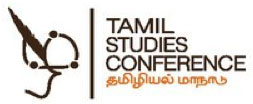 • The Seventh Annual Tamil Studies Conference will be held in Toronto, Canada, 11–12 May 2012. It is being organised by the
University of Toronto the University of Windsor. The plenary speakers are Noboru Karashima, Emeritus Professor, University of Tokyo, Japan; and
A.R. Venkatachalapathy, Professor, Madras Institute for Development Studies, Chennai, India.
This conference aims to understand the means by which people come to know, feel, and reflect upon their past. Questions of history, memory, and heritage are all guided by the ethical concerns of the present and by desires regarding the future. The production of alternatives to the dominant narrative might also entail their own forms of exclusion. Contestation arises precisely when the past becomes a resource to remake the contemporary world. But how do we narrate pasts? What counts as “evidence” in such narrations? Whose stories prevail? Which pasts are silenced? Deadline for submitting abstracts is 31 August 2011. More information.
• The Seventh Annual Tamil Studies Conference will be held in Toronto, Canada, 11–12 May 2012. It is being organised by the
University of Toronto the University of Windsor. The plenary speakers are Noboru Karashima, Emeritus Professor, University of Tokyo, Japan; and
A.R. Venkatachalapathy, Professor, Madras Institute for Development Studies, Chennai, India.
This conference aims to understand the means by which people come to know, feel, and reflect upon their past. Questions of history, memory, and heritage are all guided by the ethical concerns of the present and by desires regarding the future. The production of alternatives to the dominant narrative might also entail their own forms of exclusion. Contestation arises precisely when the past becomes a resource to remake the contemporary world. But how do we narrate pasts? What counts as “evidence” in such narrations? Whose stories prevail? Which pasts are silenced? Deadline for submitting abstracts is 31 August 2011. More information. ![]()
 •
• ![]() A
A![]() n International Conference on "Politics of Religion in Asia" will take place 12 - 13 May 2012 at the University of Iowa, USA and a call for papers is now open. The conference will focus on the development of religion and its role in politics in Asian countries, among which China, Hong Kong, Japan, South Korea, Taiwan, Singapore and India. The conference organisers from the International Programs, University of Iowa will support the participants whose papers are accepted with airfare and lodging, as well as with publishing the papers in an edited volume. Deadline for s
n International Conference on "Politics of Religion in Asia" will take place 12 - 13 May 2012 at the University of Iowa, USA and a call for papers is now open. The conference will focus on the development of religion and its role in politics in Asian countries, among which China, Hong Kong, Japan, South Korea, Taiwan, Singapore and India. The conference organisers from the International Programs, University of Iowa will support the participants whose papers are accepted with airfare and lodging, as well as with publishing the papers in an edited volume. Deadline for s![]() ubmitting proposals is 1 October 2011. More information (as a pdf-file).
ubmitting proposals is 1 October 2011. More information (as a pdf-file). ![]()
July 2012
 The 22nd European Conference on South Asian Studies (ECSAS) is scheduled for 25-28 July 2012 at the University Institute of
Lisbon (also known as ISCTE-IUL) in Portugal. Decisions about panels are expected to be announced during June 2011.
The main conference organiser is Professor Rosa Maria Perez, of the Department of Anthropology, supported by a local scientific steering committee. The venue of the conference will be on the university’s main campus in Lisbon.
The 22nd European Conference on South Asian Studies (ECSAS) is scheduled for 25-28 July 2012 at the University Institute of
Lisbon (also known as ISCTE-IUL) in Portugal. Decisions about panels are expected to be announced during June 2011.
The main conference organiser is Professor Rosa Maria Perez, of the Department of Anthropology, supported by a local scientific steering committee. The venue of the conference will be on the university’s main campus in Lisbon.
The biannual ECSAS conference is the largest gathering of South Asia oriented researchers in Europe, covering all fields from the humanities and social sciences to technology, natural sciences and medicine. The conference is held biannually under the aegis of the European Association of South Asian Studies (EASAS), a professional, non-profit organisation of scholars engaged in research and teaching concerning South Asia with regard to all periods and fields of study. (SASNET organised the 18th ECMSAS conference in Lund in 2004.)
Full information on the conference page.![]()
November 2012
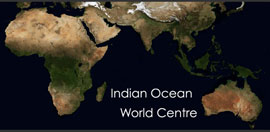 • An International conference on ”Textile Trades and Consumption in the Indian Ocean World, from Early Times to the Present” will be held in Montreal, Canada, 2–4 November 2012. It is organised by the Indian Ocean World Centre (IOWC) at
McGill University. This multi-disciplinary international conference aims to bring together scholars from across the humanities and social sciences to share findings, methodologies and theoretical perspectives on cloth’s critical role in driving exchanges in the Indian Ocean World from early times to the present day. Deadline for submission of abstracts is 30 September 2011. More information.
• An International conference on ”Textile Trades and Consumption in the Indian Ocean World, from Early Times to the Present” will be held in Montreal, Canada, 2–4 November 2012. It is organised by the Indian Ocean World Centre (IOWC) at
McGill University. This multi-disciplinary international conference aims to bring together scholars from across the humanities and social sciences to share findings, methodologies and theoretical perspectives on cloth’s critical role in driving exchanges in the Indian Ocean World from early times to the present day. Deadline for submission of abstracts is 30 September 2011. More information. ![]()
December 2012
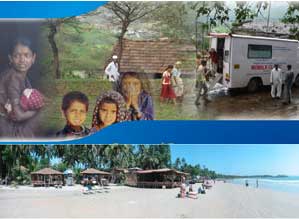 • The 18th International Congress of Rural Health & Medicine will be held from 5 - 8 December 2012 at Panjim, Goa. The congress is organised by the Pravara Institute of Medical Sciences at Deemed University, Loni, India, in collaboration with the International Association for Rural Health and Medicine, Japan and the congress theme will be ”Challenges for Health in Global Villages”. The congress aims to promote a dialogue among NGOs, academics and government on global issues related to rural health in connection to the achievement of the Millenium Development Goals. Prof. Ingalill Rahm Hallberg, Assistant Vice Chancellor of Lund University (and Professor in Health Care Science), Prof. Peter Lindqvist from the Swedish Agricultural University (SLU), and Mr. Lars-Olof Lindgren, Ambassador of Sweden to India, are members of the advisory committee comprised of delegates from more than 10 countries. For the latest news about the congress check its website.
• The 18th International Congress of Rural Health & Medicine will be held from 5 - 8 December 2012 at Panjim, Goa. The congress is organised by the Pravara Institute of Medical Sciences at Deemed University, Loni, India, in collaboration with the International Association for Rural Health and Medicine, Japan and the congress theme will be ”Challenges for Health in Global Villages”. The congress aims to promote a dialogue among NGOs, academics and government on global issues related to rural health in connection to the achievement of the Millenium Development Goals. Prof. Ingalill Rahm Hallberg, Assistant Vice Chancellor of Lund University (and Professor in Health Care Science), Prof. Peter Lindqvist from the Swedish Agricultural University (SLU), and Mr. Lars-Olof Lindgren, Ambassador of Sweden to India, are members of the advisory committee comprised of delegates from more than 10 countries. For the latest news about the congress check its website.
More information (as a pdf-file).![]()
Links to other conferences
• Norwegian Events. Several seminars connected with South Asia takes place regularly at Oslo University and other Norwegian universities. More information to be found at Asianettverket.
• Further information about conferences worldwide on South Asia, see the Agenda on Conferences, Exhibits & Events on South Asia published by SARAI (South Asia Resource Access on the Internet). Go to SARAI’s conferences page.
Conference Reports:
 The 21st European Conference on (Modern) South Asian Studies, ECMSAS, was successfully organised by the University of Bonn on 26–29 July 2010. More then 300 scholars involved in research related
to the South Asian region participated in
the conference, featuring a total number of 41 panels,
covering a broad range of research subjects. SASNET’s deputy director Lars Eklund participated in the conference. He has posted on SASNET’s web site a personal report full with photos. Go for Lars’ report from Bonn.
The 21st European Conference on (Modern) South Asian Studies, ECMSAS, was successfully organised by the University of Bonn on 26–29 July 2010. More then 300 scholars involved in research related
to the South Asian region participated in
the conference, featuring a total number of 41 panels,
covering a broad range of research subjects. SASNET’s deputy director Lars Eklund participated in the conference. He has posted on SASNET’s web site a personal report full with photos. Go for Lars’ report from Bonn.
A more formal conference report by the European Association of South Asian Studies (EASAS), was published in its Newsletter for the Summer 2010. It also contains information about the EASAS General Meeting held in connection with the Bonn conference, and also Professor Dietmar Rothermund’s lecture held at the final session of the conference, on 29 July 2010. Read the EASAS Summer 2010 Newsletter.
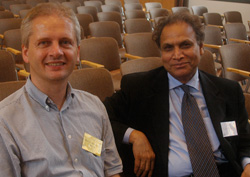 |
| The conference convener Dr. Heinz Werner Wessler and Prof. Sukhadeo Thorat, who held the Ambedkar lecture. |
The conference convener was Dr. Heinz Werner Wessler, scientific collaborator at the Institute for Oriental and Asian Studies, University of Bonn, but also since last year connected to the Department of Linguistics and Philology, Uppsala University, Sweden as a guest Professor in Hindi.
Prof. Sukhadeo Thorat, Chairman for the Indian University Grants Commission had been invited to hold the Ambedkar Lecture. His engaged presentation was entitled ”Identity, Social Exclusion and Deprived Groups. Search for Inclusive Society in Contemporary International Context”.
See Lars Ekund’s photos from the conference.
The ECMSAS conferences are held biannually under the aegis of the European Association of South Asian Studies (EASAS), a professional, non-profit organisation of scholars engaged in research and teaching concerning South Asia with regard to all periods and fields of study.
The council of the EASAS consists of a president (Prof. Roger Jeffery, University of Edinburgh, UK), vice-president and treasurer, and in addition, of six other European members reflecting the various academic disciplines represented by the Association. At EASAS’ General Meeting, held on 27 July 2010, SASNET’s Director, Dr. Anna Lindberg, was elected to become one of the new members to the council for the two-year period 2010-12. More information about EASAS.![]()
 The second SASNET conference on
South Asian Studies for young Nordic scholars was held successfully in Höllviken, south of Malmö, on 18–20 August 2010. 23 masters students, PhD candidates and recent PhDs from Sweden, Denmark, Norway and Finland participated in the three-day conference focusing on three major issues: Interdisciplinary Research; Field Work and Ethics; and Academic Career (Publishing, Teaching, Networking).
The second SASNET conference on
South Asian Studies for young Nordic scholars was held successfully in Höllviken, south of Malmö, on 18–20 August 2010. 23 masters students, PhD candidates and recent PhDs from Sweden, Denmark, Norway and Finland participated in the three-day conference focusing on three major issues: Interdisciplinary Research; Field Work and Ethics; and Academic Career (Publishing, Teaching, Networking).
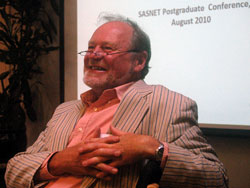 The keynote speaker was Prof. Emeritus Graham Chapman (photo) from the Dept. of Geography, Lancaster University, UK. Other main speakers were
Dr. Sirpa Tenhunen, Department of Social and Cultural Anthropology, University of Helsinki, Finland; Mr. Teddy Primack, Director of Academic Documents Associates, USA; Associate Professor Jan Vang, Department of Production, Aalborg University, Denmark; Dr. Anna Godhe, Department of Marine Ecology, University of Gothenburg; and Dr. Maria Lantz, Department of Art & Architecture, Royal University College of Fine Arts (KKH), Stockholm.
The keynote speaker was Prof. Emeritus Graham Chapman (photo) from the Dept. of Geography, Lancaster University, UK. Other main speakers were
Dr. Sirpa Tenhunen, Department of Social and Cultural Anthropology, University of Helsinki, Finland; Mr. Teddy Primack, Director of Academic Documents Associates, USA; Associate Professor Jan Vang, Department of Production, Aalborg University, Denmark; Dr. Anna Godhe, Department of Marine Ecology, University of Gothenburg; and Dr. Maria Lantz, Department of Art & Architecture, Royal University College of Fine Arts (KKH), Stockholm.
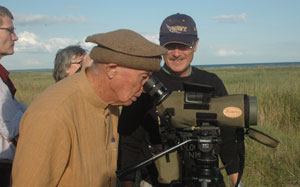 The 2010 Höllviken conference
was a follow-up to the successful conference on the same topic that SASNET arranged the year before (more information on the 2009 conference). It proved to make a difference from the standard academic conferences and paid attention explicitly to the students. Something that was evaluated very positively from all participants.
The 2010 conference was again held at Falsterbo conference retreat (Falsterbo kursgård) in Höllviken. This time an ornitological excursion led by Dr. Stig Toft Madsen was included in the programme, in order to watch birds and seals at the Falsterbo peninsula. (Prof. Bo Lindblad watches birds on photo above).
The 2010 Höllviken conference
was a follow-up to the successful conference on the same topic that SASNET arranged the year before (more information on the 2009 conference). It proved to make a difference from the standard academic conferences and paid attention explicitly to the students. Something that was evaluated very positively from all participants.
The 2010 conference was again held at Falsterbo conference retreat (Falsterbo kursgård) in Höllviken. This time an ornitological excursion led by Dr. Stig Toft Madsen was included in the programme, in order to watch birds and seals at the Falsterbo peninsula. (Prof. Bo Lindblad watches birds on photo above).
More information on the conference web page.
See the full programme in the conference folder.
See Lars Eklund’s photos from the conference
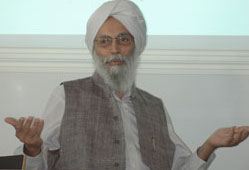 |
| Prof. Gurinder Singh Mann, the keynote speaker. |
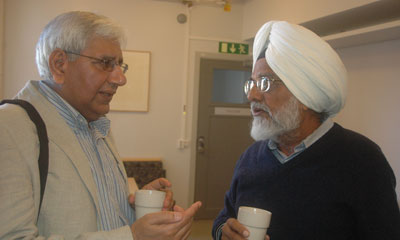 |
| Participants at the 2010 conference in Lund: Shinder Thandi, Coventry University, UK; and Swarn Singh Kahlon, independent researcher from Chandigarh, India. |
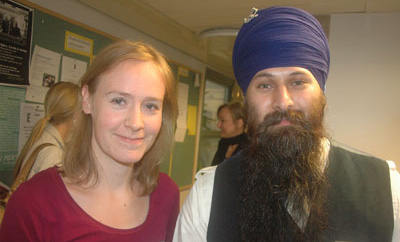 |
| Other participants: Kaveri Harriss, University of Sussex, UK; and Kamalroop Singh, University of Birmingham, UK. |
A three-day
conference on ”Sikhs in Europe. Migration, Identity and Translocal Practices” was held at Lund University, 16–18 June 2010. The conference was convened by Dr. Kristina Myrvold, Department of History and Anthropology
of Religion; Centre for Theology and Religious Studies, Lund University. The aim was to gather leading scholars in the multidisciplinary
field of Sikh studies and discuss current research projects focusing on
patterns of migration, identity formations, self-representations, transmission of
traditions and translocal practices among Sikhs in different parts of Europe.
While
two conference days were dedicated to presentation and peer-review of papers by the
members of the academic network Sikhs-in-Europe, the third conference day was a
workshop for PhD students affiliated to European universities, organised by Dr. Laura Hirvi, University of Jyväskylä, Finland.
The keynote lecture on 16 June was given by Prof. Gurinder Singh Mann, Centre for Sikh and Punjabi Studies, University of Californa at Santa Barbara, USA.
More information about the conference.
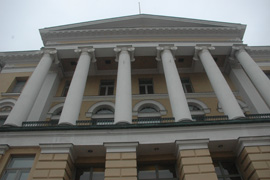 • The Nordic Association for South Asian Studies, NASA, successfully arranged a conference and a PhD workshop 26–29 May 2010 in Helsinki, Finland. The theme for the conference was ”Globalizing South Asia”, and it was organised by the University of Helsinki. The conference brought scholars from
different fields within humanities and social sciences (history, anthropology, sociology, economics,
geography, environmental science, development studies and political science)
together to analyze cultural, economic, political and environmental
connections in South Asia. Both Nordic
and non-Nordic scholars were invited to participate in the conference that was meant to stimulate
networking and exchange, and to create a forum for discussions for
scholars and doctoral students within and outside the Nordic countries. The conference was convened by Dr. Sirpa Tenhunen, Dept. of Social and Cultural Anthropology, University of Helsinki, and Dr. Klaus Karttunen, South Asian Studies, Dept. of World Cultures, University of Helsinki.
• The Nordic Association for South Asian Studies, NASA, successfully arranged a conference and a PhD workshop 26–29 May 2010 in Helsinki, Finland. The theme for the conference was ”Globalizing South Asia”, and it was organised by the University of Helsinki. The conference brought scholars from
different fields within humanities and social sciences (history, anthropology, sociology, economics,
geography, environmental science, development studies and political science)
together to analyze cultural, economic, political and environmental
connections in South Asia. Both Nordic
and non-Nordic scholars were invited to participate in the conference that was meant to stimulate
networking and exchange, and to create a forum for discussions for
scholars and doctoral students within and outside the Nordic countries. The conference was convened by Dr. Sirpa Tenhunen, Dept. of Social and Cultural Anthropology, University of Helsinki, and Dr. Klaus Karttunen, South Asian Studies, Dept. of World Cultures, University of Helsinki.
A peer-reviewed volume of selected papers will be published after the
conference. Contributions are invited which take into account the broader context of local issues concerning culture and society in globalizing South Asia, both empirically and theoretically. Papers should be submitted to the conference organisers by the end of October 2010. The maximum length is 9000 words.
 Anna Lindberg and Lars Eklund from SASNET both participated in this important Nordic conference.
Anna Lindberg and Lars Eklund from SASNET both participated in this important Nordic conference.
Full information about the 2010 NASA conference, including full programme.
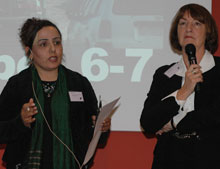 |
| Mary Akrami from the Afghan Women Skills Development Center (AWSDC) and Elizabeth Winter, European Network of NGOs in Afghanistan (ENNA), at the Stockholm conference. |
• An International conference on ”Peacebuilding in Afghanistan: Local, regional and global perspectives” was held in Stockholm 6–7 November 2008. The conference focused on what the peacebuilding efforts look like in the country? What roles do the Afghan authorities, the International Community, the UN and the Nato-led ISAF forces play? Do they contribute to peace or armed conflict? Are there local initiatives at grassroots level promoting peace and how does the civilian population contribute to the reconstruction of the country? Why does Afghanistan receive so little funding for reconstruction compared to other areas of armed conflict? Have the complex developments in Afghanistan become something that the West would rather not have to deal with? What actions are needed in order for Afghanistan to become a country of peace and stability?
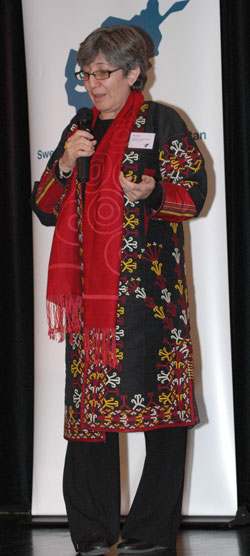 The conference was organised by the Swedish Committee for Afghanistan (SCA), in cooperation with ENNA (European Network of NGOs in Afghanistan). Invited speakers included prominent persons such as Sima Samar (photo to the right), Chairperson of the Afghan Independent Human Rights Commission; Kristian Berg Harpviken,
senior researcher at the International Peace Research Institute (PRIO) in Oslo; and the eminent Pakistani writer/journalist Ahmed Rashid.
The conference was organised by the Swedish Committee for Afghanistan (SCA), in cooperation with ENNA (European Network of NGOs in Afghanistan). Invited speakers included prominent persons such as Sima Samar (photo to the right), Chairperson of the Afghan Independent Human Rights Commission; Kristian Berg Harpviken,
senior researcher at the International Peace Research Institute (PRIO) in Oslo; and the eminent Pakistani writer/journalist Ahmed Rashid.
Read a report by Lars Eklund, who represented SASNET at the conference.
All the conference presentations are now available in full-text on the Internet. Go to the presentations.
• An international symposium and an exhibition on urban growth titled ”Informal Cities – The Stockholm Urban Think Tank” was organised in Nacka/Stockholm 6–8 September 2008. It was a collaboration project between the Royal University College of Fine Arts, SHACK/Slum Dwellers International and the Swedish International Development Agency’s (Sida) Division for Urban Development. Sixteen artists, filmmakers and architects organized the symposium and parallel exhibition as part of the post-graduate program Art & Architecture at the Royal Institute of Art (KKH) in Stockholm. Informal Cities – The Stockholm Urban Think Tank was intended to be a meeting place where representatives of grass-root organizations from seven informal cities shared their experiences together with renowned scholars and activists such as Saskia Sassen, David Satterswaithe, Barbara Southworth, Sheela Patel and Jockin Arputham. More information. Ms. Maria Tonini from SASNET also participated in the three-day seminar. Read her report.
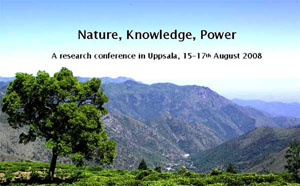 • SASNET was the main funder for the international research conference on “Nature, Knowledge, Power” that was held in Uppsala 15-17 August 2008. The conference, hosted by the Department of Urban and Rural Development at the Swedish University of Agricultural Sciences (SLU), brought together researchers from different academic fields, concerned with questions of environment and society under present and historical conditions. About forty researchers and research students equally from South Asian and European universities participated in the conference and 25 full research papers were presented papers within five panels: “Energy: renewable and sustainable?”, “Competing rights, codifying law”, “Community rights under neoliberal rule”, “Who needs conservation? Nature, people, survival”, and “Ideologies of environmental change: from imperial modernization to postcolonial social equality?” The keynote speakers were Dr. Amita Baviskar from the Institute of Economic Growth at Delhi University, India and Prof. Arun Agrawal, University of Michigan. More information about the Uppsala conference.
• SASNET was the main funder for the international research conference on “Nature, Knowledge, Power” that was held in Uppsala 15-17 August 2008. The conference, hosted by the Department of Urban and Rural Development at the Swedish University of Agricultural Sciences (SLU), brought together researchers from different academic fields, concerned with questions of environment and society under present and historical conditions. About forty researchers and research students equally from South Asian and European universities participated in the conference and 25 full research papers were presented papers within five panels: “Energy: renewable and sustainable?”, “Competing rights, codifying law”, “Community rights under neoliberal rule”, “Who needs conservation? Nature, people, survival”, and “Ideologies of environmental change: from imperial modernization to postcolonial social equality?” The keynote speakers were Dr. Amita Baviskar from the Institute of Economic Growth at Delhi University, India and Prof. Arun Agrawal, University of Michigan. More information about the Uppsala conference.
 • The
20th European Conference on Modern South Asian Studies (ECMSAS)
was held in Manchester, UK, 8–11 July 2008.
The 2008 conference
was hosted by the School of Arts, Histories and Cultures at
the University of Manchester, and draws on the vibrant South Asian
Studies programmes in Humanities and Social Sciences at the University.
• The
20th European Conference on Modern South Asian Studies (ECMSAS)
was held in Manchester, UK, 8–11 July 2008.
The 2008 conference
was hosted by the School of Arts, Histories and Cultures at
the University of Manchester, and draws on the vibrant South Asian
Studies programmes in Humanities and Social Sciences at the University.
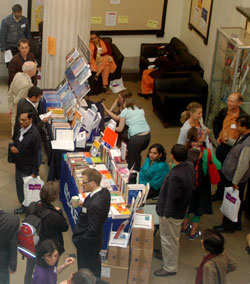 40 panels were included in the programme, covering a vast field of scientific areas, from ”Censorship, Subjectivity, and Subversion: Cultural Regulation in India from the
Colonial Era to the Present” to ”Vegetarianisms: the communicative power of meat in South Asia” and ”Routes and Roots of Democracy in the Himalayas”. Professor Sanjay Subrahmanyam (photo to the right), Professor of Indian History at the University of
California at Los Angeles (UCLA), held the keynote lecture on ”Cultures of Travel between Anjou and Agra in the Early Modern World”. The conference also offered a range of cultural events including an illustrated lecture on the textiles trade between Manchester and South Asia held at the Whitworth Art Gallery, and a reception at Manchester's spectacular town hall, built during the 1880s. SASNET’s deputy director Lars Eklund participated in the conference. More information about the conference.
40 panels were included in the programme, covering a vast field of scientific areas, from ”Censorship, Subjectivity, and Subversion: Cultural Regulation in India from the
Colonial Era to the Present” to ”Vegetarianisms: the communicative power of meat in South Asia” and ”Routes and Roots of Democracy in the Himalayas”. Professor Sanjay Subrahmanyam (photo to the right), Professor of Indian History at the University of
California at Los Angeles (UCLA), held the keynote lecture on ”Cultures of Travel between Anjou and Agra in the Early Modern World”. The conference also offered a range of cultural events including an illustrated lecture on the textiles trade between Manchester and South Asia held at the Whitworth Art Gallery, and a reception at Manchester's spectacular town hall, built during the 1880s. SASNET’s deputy director Lars Eklund participated in the conference. More information about the conference.
 The ECMSAS is the largest gathering of South Asia oriented researchers
in Europe, covering all fields from the humanities and social sciences
to technology, natural sciences and medicine. The conference is
held biannually under the aegis of the European Association of
South Asian Studies (EASAS), a professional, non-profit organisation
of scholars engaged in research and teaching concerning South Asia
with regard to all periods and fields of study.
SASNET organised
the 18th ECMSAS conference in Lund in 2004 (more
information about the Lund conference), and in June 2006, the
19th ECMSAS conference was arranged in Leiden, the Netherlands
(read SASNET’s report
from the Leiden conference).
The ECMSAS is the largest gathering of South Asia oriented researchers
in Europe, covering all fields from the humanities and social sciences
to technology, natural sciences and medicine. The conference is
held biannually under the aegis of the European Association of
South Asian Studies (EASAS), a professional, non-profit organisation
of scholars engaged in research and teaching concerning South Asia
with regard to all periods and fields of study.
SASNET organised
the 18th ECMSAS conference in Lund in 2004 (more
information about the Lund conference), and in June 2006, the
19th ECMSAS conference was arranged in Leiden, the Netherlands
(read SASNET’s report
from the Leiden conference).
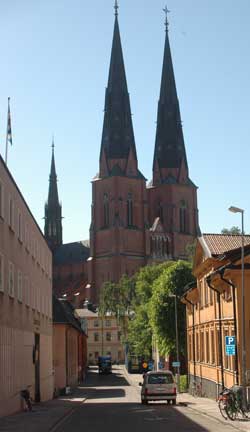 • For the fourth time, Sida/SAREC – the unit for research cooperation within the the Swedish International Development Cooperation Agency Sida – financed a conference on current Swedish development research, in Uppsala 27–29 May 2008. Previously Sida has initiated three similar conferences, the first one in Göteborg in 2000, the second in Lund in 2003 (more information), and the third one, focusing on ”Structures of Vulnerability:
Mobilisation and Resistance”, was held in Stockholm in 2005 (more information). The 2008 conference was organised by the Centre for Sustainable Development in Uppsala, an inter-disciplinary centre for education and research on sustainable development, jointly run by Uppsala University and the Swedish University of Agricultural Sciences (SLU) in Uppsala.
The general theme for the three-day conference was “Meeting Global Challenges in Research Cooperation”. Researchers and development professionals were invited to gather and discuss key themes at the frontiers of research and global development issues.
• For the fourth time, Sida/SAREC – the unit for research cooperation within the the Swedish International Development Cooperation Agency Sida – financed a conference on current Swedish development research, in Uppsala 27–29 May 2008. Previously Sida has initiated three similar conferences, the first one in Göteborg in 2000, the second in Lund in 2003 (more information), and the third one, focusing on ”Structures of Vulnerability:
Mobilisation and Resistance”, was held in Stockholm in 2005 (more information). The 2008 conference was organised by the Centre for Sustainable Development in Uppsala, an inter-disciplinary centre for education and research on sustainable development, jointly run by Uppsala University and the Swedish University of Agricultural Sciences (SLU) in Uppsala.
The general theme for the three-day conference was “Meeting Global Challenges in Research Cooperation”. Researchers and development professionals were invited to gather and discuss key themes at the frontiers of research and global development issues.
![]() On the final day of the conference, representatives from the Swedish research councils met for a panel discussion titled ”Strategies for Swedish funding of international
research cooperation”. Berit Olsson, Head of Sida’s department for research cooperation (SAREC), presented Sida’s new research
funding strategy.
Pär Omling, Director General, Swedish Research Council; Lena Gustafsson, First Deputy Director General, Swedish Governmental Agency for
Innovation Systems (Vinnova); and
Hans-Örjan Nohrstedt, Head for the Unit on Strategy and Analysis, The Swedish
Research Council Formas, presented their present work and ideas for the future. The discussion was moderated by Gunnar Öqvist, Permanent Secretary, Royal
Academy of Science; and also Chair, Sida Research Committee.
On the final day of the conference, representatives from the Swedish research councils met for a panel discussion titled ”Strategies for Swedish funding of international
research cooperation”. Berit Olsson, Head of Sida’s department for research cooperation (SAREC), presented Sida’s new research
funding strategy.
Pär Omling, Director General, Swedish Research Council; Lena Gustafsson, First Deputy Director General, Swedish Governmental Agency for
Innovation Systems (Vinnova); and
Hans-Örjan Nohrstedt, Head for the Unit on Strategy and Analysis, The Swedish
Research Council Formas, presented their present work and ideas for the future. The discussion was moderated by Gunnar Öqvist, Permanent Secretary, Royal
Academy of Science; and also Chair, Sida Research Committee.
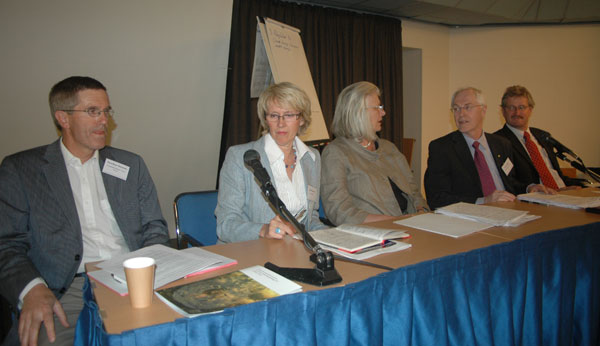 |
| From left to right: Hans-Örjan Nohrstedt, Lena Gustafsson, Berit Olsson, Gunnar Öqvist and Pär Omling. |
Otherwise, the well-attended conference – more than 450 participants – consisted of panels, focusing on topics such as sustainable energy systems, maternal and child health, water and sanitation, soil degradation, sustainable agriculture, survival strategies of the poor, conflicts over natural resources, housing and infrastructure, human rights, democracy, global trade and climate change. All accepted conference presentations and summaries of discussions will later be published in a book.
One year later, on 6 July 2009, the proceedings from the conference ”Meeting Global Challenges in Research Cooperation” were published. All the keynote speeches, discussion summaries, papers on thematic and trans-disciplinary research, and close to 200 abstracts are included in the conference report, a publication of 651 pages, published as a pdf-file on the web. The report also includes draft research priorities from the parallel conference sessions. The report has been edited by Ingrid Karlsson and Kristina Röing de Nowina from Uppsala Centre for Sustainable Development. Go for the extensive conference report.
Lars Eklund from SASNET participated in the 2008 Uppsala conference. Read his report, focusing on the South Asian elements.
• An International conference on ”Biotechnology for Sustainable Development”, was held 7–9 January 2008 in Pune, India. The conference, named BSD – 2008, was organised by the Chemical Engineering and Process Development Division at the National Chemical Laboratory (NCL) in Pune, in collaboration with the Dept. of Biotechnology, Lund University, Sweden. It was supported by the Swedish Foundation for Strategic Environmental Research (Mistra) and the Indian Council of Scientific and Industrial Research (CSIR). It highlighted the latest developments areas such as • Biotechnology for production of green chemicals; • Biorefinery – Use of plantation crops for production of Chemicals; • Bioremediation of solid, gaseous and liquid wastes; and • Waste water treatment and recycle using clean technologies. More information in a report given in Mistra Newsletter 2/08 (in Swedish).
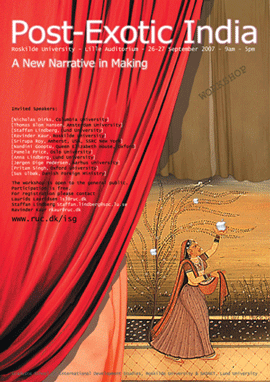 • The
Graduate School of International Development Studies, Roskilde
University Centre (RUC) organised a two-days workshop titled ”Post-Exotic
India – a new Narrative in Making?” in collaboration
with SASNET on 26-27 September 2007 in Roskilde, Denmark. The seminar
was prepared by Dr. Ravinder Kaur and Prof. Laurids Lauridsen from
RUC and Prof. Staffan Lindberg, Lund University. The workshop aimed
to posit and explore the post-exotic India through the following
themes:
• processes and effects of 1991 economic liberalisation, • emergence
of a vocal, mobile and astute middle class, • global ambitions
of India, and • its regional implications in South Asia. Invited
speakers included Nicholas Dirks, Columbia University, USA; Pritam
Singh, Oxford University, UK; Thomas Blom Hansen, Amsterdam University,
Netherlands; and Srirupa Roy, Amherst, USA, SSRC New York (TBC).
Besides being a workshop open to the public, it will also
be an Intensive PhD workshop. Venue: Roskilde University Centre, Lille Auditorium. More information (as a pdf-file)
• The
Graduate School of International Development Studies, Roskilde
University Centre (RUC) organised a two-days workshop titled ”Post-Exotic
India – a new Narrative in Making?” in collaboration
with SASNET on 26-27 September 2007 in Roskilde, Denmark. The seminar
was prepared by Dr. Ravinder Kaur and Prof. Laurids Lauridsen from
RUC and Prof. Staffan Lindberg, Lund University. The workshop aimed
to posit and explore the post-exotic India through the following
themes:
• processes and effects of 1991 economic liberalisation, • emergence
of a vocal, mobile and astute middle class, • global ambitions
of India, and • its regional implications in South Asia. Invited
speakers included Nicholas Dirks, Columbia University, USA; Pritam
Singh, Oxford University, UK; Thomas Blom Hansen, Amsterdam University,
Netherlands; and Srirupa Roy, Amherst, USA, SSRC New York (TBC).
Besides being a workshop open to the public, it will also
be an Intensive PhD workshop. Venue: Roskilde University Centre, Lille Auditorium. More information (as a pdf-file)
 • SASNET successfully held a workshop on the "Role
of South Asia in the Internationalisation of Higher Education
in Sweden" at Nobel Forum, Karolinska Institutet in Stockholm
28-29 November 2006. It was jointly organised by SASNET,
Karolinska Institutet Medical University and the Swedish Institute,
and involved sessions with representatives from 20 Swedish universities,
and from the International Programme Office for Education and
Training; the Swedish National Agency for Higher Education; STINT;
the Government ministries of Education and Foreign Affairs; and
the South Asian embassies in Stockholm. The
focus was on experiences from masters and PhD programmes in Sweden
as well as in South Asia, with an aim to promote increased academic
exchange with South Asia.
Most of the workshop presentations are now available on our web
site as pdf-files. They include Mr. Sunandan Roy Chowdhury’s
provocative keynote presentation,
titled ”The Moffusil and the Metropolitan – Higher
Education’s Meandering Paths”. In addition to
this, Jan Magnusson (a key person behind the creation of SASNET
seven years ago and now a member of SASNET’s board) has written
a report, summarizing the two-day workshop sessions. Read
the workshop report.
• SASNET successfully held a workshop on the "Role
of South Asia in the Internationalisation of Higher Education
in Sweden" at Nobel Forum, Karolinska Institutet in Stockholm
28-29 November 2006. It was jointly organised by SASNET,
Karolinska Institutet Medical University and the Swedish Institute,
and involved sessions with representatives from 20 Swedish universities,
and from the International Programme Office for Education and
Training; the Swedish National Agency for Higher Education; STINT;
the Government ministries of Education and Foreign Affairs; and
the South Asian embassies in Stockholm. The
focus was on experiences from masters and PhD programmes in Sweden
as well as in South Asia, with an aim to promote increased academic
exchange with South Asia.
Most of the workshop presentations are now available on our web
site as pdf-files. They include Mr. Sunandan Roy Chowdhury’s
provocative keynote presentation,
titled ”The Moffusil and the Metropolitan – Higher
Education’s Meandering Paths”. In addition to
this, Jan Magnusson (a key person behind the creation of SASNET
seven years ago and now a member of SASNET’s board) has written
a report, summarizing the two-day workshop sessions. Read
the workshop report.
• A conference titled ”Asian Studies at a Turning Point: Tandem walk or boxing match between social sciences and humanities?” was held at the University of Turku, Finland, 6–7 November 2006. It ran parallell with an Intensive PhD Course for Nordic PhD students in Asian studies. The conference sets out to offer a platform for academic dialogue on a wide range of methodological and paradigamatic topics across disciplinary and regional boundaries in Asian studies (including South Asian studies). SASNET’s Director, Prof. Staffan Lindberg, participated in the conference. Read his report from the Turku conference .
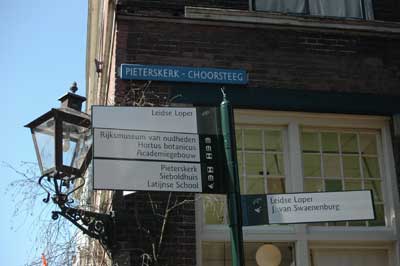 •
The 19th European Conference on Modern South Asian Studies (ECMSAS)
was successfully held 27–30 June 2006 in Leiden, the
Netherlands. It was hosted and organized by the International
Institute for Asian Studies (IIAS) on behalf of the European
Association for South Asian Studies, EASAS. The conference
web page is now updated with panel reports, participants list
and photos from the conference. More
information about the 19th ECMSAS conference in Leiden.
•
The 19th European Conference on Modern South Asian Studies (ECMSAS)
was successfully held 27–30 June 2006 in Leiden, the
Netherlands. It was hosted and organized by the International
Institute for Asian Studies (IIAS) on behalf of the European
Association for South Asian Studies, EASAS. The conference
web page is now updated with panel reports, participants list
and photos from the conference. More
information about the 19th ECMSAS conference in Leiden.
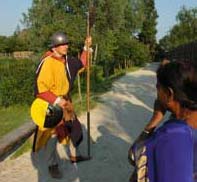 On
the final day the conference’s ”business meeting” was
held along with the fifth General Meeting of European Association
for South Asian Studies. The meeting decided to formalise the
relationship between ECMSAS and EASAS, something that was not
there earlier. Nominations for new EASAS board members were
received, and a discussion was held about the venue for the
next ECMSAS conference, to be held in 2008 at the
University of Manchester, UK.
On
the final day the conference’s ”business meeting” was
held along with the fifth General Meeting of European Association
for South Asian Studies. The meeting decided to formalise the
relationship between ECMSAS and EASAS, something that was not
there earlier. Nominations for new EASAS board members were
received, and a discussion was held about the venue for the
next ECMSAS conference, to be held in 2008 at the
University of Manchester, UK.
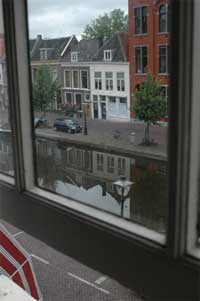 SASNET
was also represented at the conference in Leiden. Prof. Staffan
Lindberg, Director of SASNET, chaired panel No. 32 on ”Post
Green Revolution Agrarian Transformation in South
Asia”, and he also participated in a panel discussion
on the formation of ANERI, the Academic Network for European
Research related to India, initiated by the European Commission
(and formally launched during the Leiden conference). SASNET’s
deputy director/webmaster Lars Eklund also participated in
the 2006 conference, visited several panels and followed the
discussions. Lars made a photographic documentation. See
his photos from the Leiden conference.
SASNET
was also represented at the conference in Leiden. Prof. Staffan
Lindberg, Director of SASNET, chaired panel No. 32 on ”Post
Green Revolution Agrarian Transformation in South
Asia”, and he also participated in a panel discussion
on the formation of ANERI, the Academic Network for European
Research related to India, initiated by the European Commission
(and formally launched during the Leiden conference). SASNET’s
deputy director/webmaster Lars Eklund also participated in
the 2006 conference, visited several panels and followed the
discussions. Lars made a photographic documentation. See
his photos from the Leiden conference.
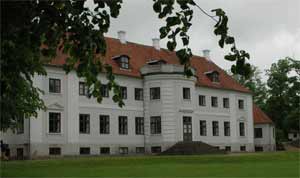 • After a gap of four years the Nordic Association for South Asian
Studies, NASA, successfully arranged a conference 3–5 June
2005 in Aarhus, Denmark. Nearly 50 people met up for the
conference, that had the theme ”Contemporary Dramas of
South Asia: Economic, Social, Political and Cultural Changes/Upheavals”.
It was organised by the Department
of Anthropology and Ethnography at the University of Aarhus
(main convenor: Dr. Lars Kjaerholm).
Look
at photos from the conference, shot by Lars Eklund, SASNET.
• After a gap of four years the Nordic Association for South Asian
Studies, NASA, successfully arranged a conference 3–5 June
2005 in Aarhus, Denmark. Nearly 50 people met up for the
conference, that had the theme ”Contemporary Dramas of
South Asia: Economic, Social, Political and Cultural Changes/Upheavals”.
It was organised by the Department
of Anthropology and Ethnography at the University of Aarhus
(main convenor: Dr. Lars Kjaerholm).
Look
at photos from the conference, shot by Lars Eklund, SASNET.
 After some amalgamation the conference covered five workshops:
After some amalgamation the conference covered five workshops:
1. Globalization, economic changes and socio-political upheavals
+ A South Asian security conundrum? (convenors: Jørgen
Dige Pedersen, University of Aarhus, and Sten
Widmalm, Uppsala University)
2. States and minorities in South Asia. + Anti-oppressive movements
(convenors: Peter B Andersen, Copenhagen
University, and Aase Mygind Madsen,
Århus).
3. Secularism in South Asia + Imagining Nations: middle classes
and processes of nation formation in South Asia (convenors: Erik
Sand, Copenhagen University, and Lars Kjærholm. Aarhus
University.)
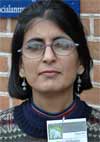 |
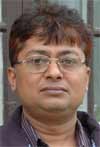 |
4. Health, Globalization and Marginalization in South Asia (convenor:
Jens Seeberg. Aarhus University). Two
Indian participants in this panel, Renu Addlakha and Pramod Shankpal
(photos to the right) were funded for by SASNET.
5. Exploring South Asian political culture(convenors: Arild
Engelsen Ruud and Pamela Price,
Oslo University).
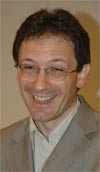 The
conference had four keynote speakers: Professor Zoya Hasan, Centre
for Political Studies, Jawarharlal Nehru University, New Delhi,
lectured on ”The Struggle for Democratic Representation
by marginalised groups (OBC’s, women, minorities) in India”,
Dr. Christophe Jaffrelot, director of the Centre d’Etudes
et Recherches Internationales (CERI), Paris (photo to the right),
lectured on ”BJP/Sangh Parivar and the electoral defeat
in 2004”; Professor Martin Sökefeld, Dept. of Anthropology,
Hamburg University, lectured on ”Continuing struggles,
enduring drama: Kashmir and the construction of nations in South
Asia”; and finally Professor Isabelle Clark-Deces, Department
of Anthropology, Princeton University, lectured on ”The
Encounter never stops: Revisiting Caste, Hierarchy and Dominance
in a Tamil Village”. Venue for the conference was Moesgård
Museum (the Manor House of Moesgård) in the picturesque forest
area south of Århus
The
conference had four keynote speakers: Professor Zoya Hasan, Centre
for Political Studies, Jawarharlal Nehru University, New Delhi,
lectured on ”The Struggle for Democratic Representation
by marginalised groups (OBC’s, women, minorities) in India”,
Dr. Christophe Jaffrelot, director of the Centre d’Etudes
et Recherches Internationales (CERI), Paris (photo to the right),
lectured on ”BJP/Sangh Parivar and the electoral defeat
in 2004”; Professor Martin Sökefeld, Dept. of Anthropology,
Hamburg University, lectured on ”Continuing struggles,
enduring drama: Kashmir and the construction of nations in South
Asia”; and finally Professor Isabelle Clark-Deces, Department
of Anthropology, Princeton University, lectured on ”The
Encounter never stops: Revisiting Caste, Hierarchy and Dominance
in a Tamil Village”. Venue for the conference was Moesgård
Museum (the Manor House of Moesgård) in the picturesque forest
area south of Århus
• On March 19 2005 a one-day workshop on Sikh and Punjab Studies was arranged at the Centre for Theology and Religious Studies at Lund University. The workshop was attended by about 60 people, including students and teachers from various universities in Scandinavia, as well as members of the Sikh communities in Sweden and Denmark. The key speakers were internationally renowned experts from Germany, Sweden, UK and USA, who are working within the interdisciplinary field of Sikh and Punjab Studies. Read Kristina Myrvold’s conference report.
• An International Seminar on the ”Emergence
of Militant Islamism and its Relevance for Afghanistan” was
held in Stockholm 10–11 March 2005.
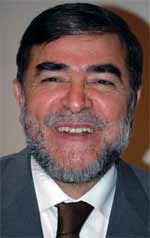 The Swedish Committee for Afghanistan arranged the seminar, with
support from Sida. Speakers included Professor Ahmad Moussalli from
Beirut and the journalist Ahmed Rashid. Two cabinet ministers from
the new Afghanistan government were also invited as key speakers,
the Deputy Minister of Foreign Affairs, Haider Reza (photo to
the right); and the Deputy Minister of Interior, Shahmahmood
Miakhel. Read SASNET’s report from
the conference
The Swedish Committee for Afghanistan arranged the seminar, with
support from Sida. Speakers included Professor Ahmad Moussalli from
Beirut and the journalist Ahmed Rashid. Two cabinet ministers from
the new Afghanistan government were also invited as key speakers,
the Deputy Minister of Foreign Affairs, Haider Reza (photo to
the right); and the Deputy Minister of Interior, Shahmahmood
Miakhel. Read SASNET’s report from
the conference
The Dept. of Social Anthropology
at Stockholm University in collaboration with Sida successfully
organised a conference focusing on ”Structures of Vulnerability:
Mobilisation and Resistance” 12–14 January 2005.
It was the largest gathering so far in Sweden of Third world oriented
researchers, within fields such as Biodiversity, Children and youth,
Climate, Corruption, Environment, Ethnicity, Food and water, Gender,
Hazards, Health, Infrastructure, Law, Religion, Urbanity, War and
violence, and Welfare. More than 300 researchers and graduate/post
graduate students took part in the conference, and a vast number
of South Asia related research papers were presented in the workshops.
Keynote
speakers were Professor Ben Wisner,
lecturing on ”Root causes of vulnerability: What do we
know after 30 years and what is to be done about them”,
Professor Hunter Wade and Professor
Johanne Sundby. A panel debate was
also held on ”Victims and Actors – who get the blame?
Concepts of structure and agency in the development research”,
with Ass. Prof. Hans Abrahamsson and
Prof. Björn Hettne from PADRIGU,
Göteborg University, Prof. Thomas Hylland
Erikssen, Oslo University, and Prof. Gudrun
Dahl, Dept. of Social Anthropology, Stockholm University
(photo above).
It was the third conference in a series of conferences financed
by Sida, on the challenges faced by the research community in developing
countries. The first conference was arranged with Göteborg
University in January 2000, and the second, named ”Poor and
Rich” was held at Lund University in January 2003 (more
information on the Lund conference).
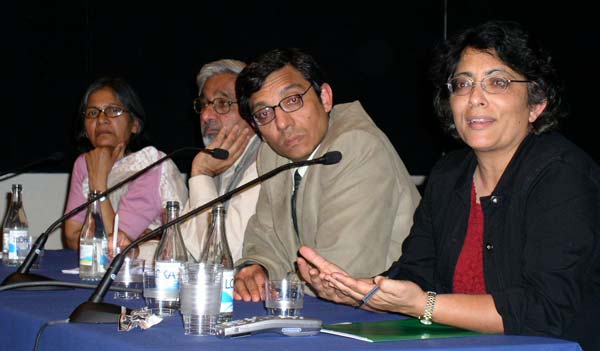 • SASNET successfully arranged the 18th European Conference on Modern
South Asian Studies in Lund 6–9 July 2004. With 360
participants from all over the World actually turning up (including
a large number of PhD candidates and participants from South Asia
itself) it was the largest ECMSAS conference so far, and certainly
the largest gathering ever on Swedish soil of South Asia oriented
researchers, covering all fields from the humanities and social
sciences to technology, natural sciences and medicine.
• SASNET successfully arranged the 18th European Conference on Modern
South Asian Studies in Lund 6–9 July 2004. With 360
participants from all over the World actually turning up (including
a large number of PhD candidates and participants from South Asia
itself) it was the largest ECMSAS conference so far, and certainly
the largest gathering ever on Swedish soil of South Asia oriented
researchers, covering all fields from the humanities and social
sciences to technology, natural sciences and medicine.
Day-by-day reports with photos by Behnoosh Payvar, Masters student
of South Asian Studies, Lund University, were published on the conference
web site. Full updated information on the
Lund conference.
A large number of full papers presented to the
44 conference panels are already posted on the conference
website, and more will follow after the conference. See the full
list of conference panels, abstracts and papers
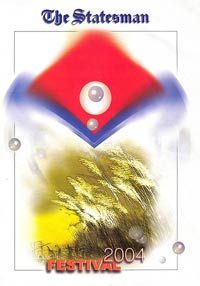 •
The extensive Conference Diary written by Dr. William Radice during
the 18th European Conference on Modern South Asian Studies, organised
by SASNET 6–9 July 2004, was published in extenso
in the 2004 Puja Festival magazine, by the Indian newspaper The
Statesman, Kolkata (October 2004). The article was illustrated with
photos of Lund University. Radice’s
article, called ”Swedish Rhapsody”, also appears
here on SASNET’s web site (as a pdf-file)
•
The extensive Conference Diary written by Dr. William Radice during
the 18th European Conference on Modern South Asian Studies, organised
by SASNET 6–9 July 2004, was published in extenso
in the 2004 Puja Festival magazine, by the Indian newspaper The
Statesman, Kolkata (October 2004). The article was illustrated with
photos of Lund University. Radice’s
article, called ”Swedish Rhapsody”, also appears
here on SASNET’s web site (as a pdf-file)
• An Interdisciplinary Conference on ”Livelihood strategies among forest-related tribal groups of South India: Contextual analysis of local livelihood strategies” was arranged at the Centre for Indian Studies, Mysore, India, 17–19 October 2003. The conference was jointly organized by the Dept. of Social Anthropology, Stockholm University, Sweden, and the Centre for Research on Environment, Development, Innovations, Technology & Trade (CREDITTe), Bangalore, India, with support from SASNET. The focus for the conference was on forest-related tribals in South India, groups living within the four southern states of India. More information (including papers to download), and Christer Norström’s conference report.
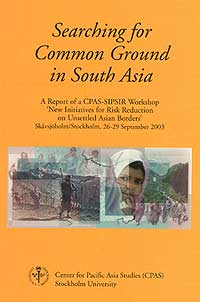 •
Distinguished experts from India and Pakistan within the fields
of military and strategic experience and confidence building
measures met for a workshop on India-Pakistan tensions in Skåvsjöholm/Stockholm,
26-29 September 2003, and a follow-up brainstorming
workshop was arranged in Uppsala 1–4 June 2004. The workshops
were organised by Center for Pacific Asia
Studies (CPAS), Department of Oriental Languages, Stockholm
University in collaboration with SIPSIR (Swedish Initiative
for Peace, Security and International Relations), and convened
by Dr. Ravinder Pal Singh, CPAS. Among the participants were
high-profile personalities such as Lt Gen Moti Dar (former
Vice-Chief of the Indian Army Staff, and involved in Indo-Pakistan
Track II diplomacy), Mr Salman Haidar (former Indian Foreign
Secretary, Ambassador to China, and High commissioner to UK),
and Gen Jehangir Karamat (former Chairman Joint Chiefs of Staff
and Chief of Army Staff of Pakistan). And besides these a number
of scholars also took part in the workshop, among them Dr Ishtiaq
Ahmed from the Dept. pf Political Science,
Stockholm University; and Dr Pervez Hoodbhoy, Professor of
Physics at Quaid-e-AzamUniversity, Islamabad. The report of
the first workshop was published a s a book titled ”Searching
for Common Ground in South Asia” in January 2004, and
was later also published in extenso on the Internet, as a pdf-file. Go
for the book.
•
Distinguished experts from India and Pakistan within the fields
of military and strategic experience and confidence building
measures met for a workshop on India-Pakistan tensions in Skåvsjöholm/Stockholm,
26-29 September 2003, and a follow-up brainstorming
workshop was arranged in Uppsala 1–4 June 2004. The workshops
were organised by Center for Pacific Asia
Studies (CPAS), Department of Oriental Languages, Stockholm
University in collaboration with SIPSIR (Swedish Initiative
for Peace, Security and International Relations), and convened
by Dr. Ravinder Pal Singh, CPAS. Among the participants were
high-profile personalities such as Lt Gen Moti Dar (former
Vice-Chief of the Indian Army Staff, and involved in Indo-Pakistan
Track II diplomacy), Mr Salman Haidar (former Indian Foreign
Secretary, Ambassador to China, and High commissioner to UK),
and Gen Jehangir Karamat (former Chairman Joint Chiefs of Staff
and Chief of Army Staff of Pakistan). And besides these a number
of scholars also took part in the workshop, among them Dr Ishtiaq
Ahmed from the Dept. pf Political Science,
Stockholm University; and Dr Pervez Hoodbhoy, Professor of
Physics at Quaid-e-AzamUniversity, Islamabad. The report of
the first workshop was published a s a book titled ”Searching
for Common Ground in South Asia” in January 2004, and
was later also published in extenso on the Internet, as a pdf-file. Go
for the book.
In April 2005 five papers from the follow-up seminar were also
published in theprinted CPAS Journal (The Stockholm Journal of
East Asian Studies). More information.
• A fruitful two days seminar on ”Religious
Mobilisation and Organised Violence in Contemporary South Asia”
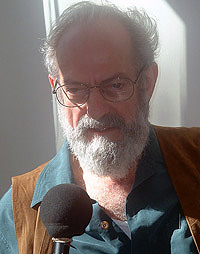 was organised by the Graduate School of International Development
Studies, Roskilde University Centre, 3-4 April 2003. Among the lecturers
and discussants were the renowned professors Paul R Brass, University
of Washington, USA (photo); Jan Breman, Amsterdam, the
Netherlands; Dipankar Gupta, JNU, New Delhi, India; Ian Talbott,
Coventry, UK; and Thomas Blom Hansen, Edinburgh, UK. Read
the extensive SASNET review of the Roskilde seminar and the papers
presented.
was organised by the Graduate School of International Development
Studies, Roskilde University Centre, 3-4 April 2003. Among the lecturers
and discussants were the renowned professors Paul R Brass, University
of Washington, USA (photo); Jan Breman, Amsterdam, the
Netherlands; Dipankar Gupta, JNU, New Delhi, India; Ian Talbott,
Coventry, UK; and Thomas Blom Hansen, Edinburgh, UK. Read
the extensive SASNET review of the Roskilde seminar and the papers
presented.
In September 2005 SAGE Publications released a book containing the
material from the Roskilde conference. The book, edited by Ravinder
Kaur, is called ”Religion, Violence
and Political Mobilisation in South Asia”. Information
about the book.
• A conference on
Swedish Development Studies research, named ”Fattiga
och rika. Aktuell utvecklingsforskning och dess villkor i Sverige”
was organised by Sida/SAREC and Lund University on 9–11
January 2003. The conditions for development research in Sweden
were thoroughly discussed, and a large number of Swedish researchers
presented their projects/programmes during the extremely fruitful
conference. Several of the projects are related to South Asia. See
SASNET’s list of these, most of them accompanied by abstracts.
We are also happy to present papers presented by two of the key
speakers:
• Professor Barbara Harriss-White on ”Unruly
and Informal Globalisation and its Impact on Development: A Background
Note”. (Word document).
• Professor Keith Griffin on ”Economic
Globalisation and Institutions
of Global Governance” (Word document).
• Representatives from the research councils, from Sida, and the Swedish universities participated in a fruitful discussion on the future for Swedish development studies research at the last day of the conference, in a panel called ”Goda råd är dyra – utvecklingsforskningens organisation och finansiering” (Good advises are costly – how to organize and finance development studies research). Summary of the discussion prepared by SASNET’s Staffan Lindberg. Read his report! (in Swedish only)
• New opportunities for Indian and Swedish business development. More than one hundred Indian and Swedish business leaders met in a seminar in Stockholm on 7 October 2002 under the heading ‘India and Sweden – New Vistas of Cooperation’. Read a report by SASNET Director Staffan Lindberg, who took part in the seminar.
 • The EU–India Think Tank Seminar took place in Brussels,
Belgium, on 15–16 October 2001, with representatives from a
large number of Universities and Research institutions in Europe
and India. More information on the seminar,
in which Prof. Staffan Lindberg represented SASNET.
• The EU–India Think Tank Seminar took place in Brussels,
Belgium, on 15–16 October 2001, with representatives from a
large number of Universities and Research institutions in Europe
and India. More information on the seminar,
in which Prof. Staffan Lindberg represented SASNET.
• ”Managing Common Resources - What is the solution?”. Research papers presented at the symposium and workshop held 10-11 September 2001 at Lund University. SASNET’s Staffan Lindberg was the key organiser of the symposium.
SASNET - Swedish South Asian Studies Network/Lund
University
Address: Scheelevägen 15 D, SE-223 70 Lund, Sweden
Phone: +46 46 222 73 40
Webmaster: Lars Eklund
Last updated
2011-09-02
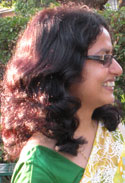
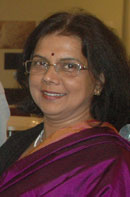 • Prof. Anjoo Sharan Upadhyaya, Director of the Nepali Research Centre in Varanasi, India, will give three open lectures at Karlstad University during the period 7-15 September 2011. The seminars are organised by the university’s Dept. of Political Science, History and the Faculty of the Humanities. Prof. Upadhyaya has formerly neen the Dean of Social Science and Head of Political Science at Banaras Hindu University (BHU). , Varanasi, India.
• Prof. Anjoo Sharan Upadhyaya, Director of the Nepali Research Centre in Varanasi, India, will give three open lectures at Karlstad University during the period 7-15 September 2011. The seminars are organised by the university’s Dept. of Political Science, History and the Faculty of the Humanities. Prof. Upadhyaya has formerly neen the Dean of Social Science and Head of Political Science at Banaras Hindu University (BHU). , Varanasi, India. 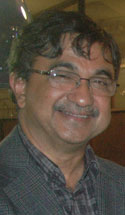 • The
• The 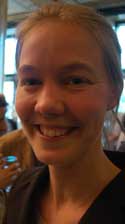 • Dr. Malin Gregersen, Department of History, Lund University holds a SASNET Brown Bag lunch lecture on Thursday 15 September 2011, 12–13. She will talk about ”Fostering Obligations: Swedish Medical Missionary Narratives from South India”. The seminar is open to the public, and held in Murbeckssalen, Gula Villan (inside the Botanical Gardens), Östra Vallgatan 14, Lund.
• Dr. Malin Gregersen, Department of History, Lund University holds a SASNET Brown Bag lunch lecture on Thursday 15 September 2011, 12–13. She will talk about ”Fostering Obligations: Swedish Medical Missionary Narratives from South India”. The seminar is open to the public, and held in Murbeckssalen, Gula Villan (inside the Botanical Gardens), Östra Vallgatan 14, Lund. 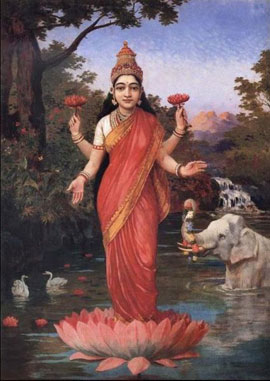 • Dr. Bidyut Mohanty, Head, Women’s Studies Department at the Institute of Social Sciences (ISS), New Delhi, India holds a SASNET lecture at Lund University on Monday 19 September 2011, 16.15–18.00. During the lecture, co-organised by
• Dr. Bidyut Mohanty, Head, Women’s Studies Department at the Institute of Social Sciences (ISS), New Delhi, India holds a SASNET lecture at Lund University on Monday 19 September 2011, 16.15–18.00. During the lecture, co-organised by 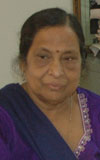 Bidyut Mohanty has been a Visiting Professor in the Global and International Studies program at the University of California, Santa Barbara and is the coordinator of an ISS and UNDP project on capacity building of elected women leaders in local government in India, and as well as of a project sponsored by the National Commission on the protection of child rights.
Bidyut Mohanty has been a Visiting Professor in the Global and International Studies program at the University of California, Santa Barbara and is the coordinator of an ISS and UNDP project on capacity building of elected women leaders in local government in India, and as well as of a project sponsored by the National Commission on the protection of child rights. 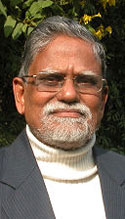 • Manoranjan Mohanty, Durgabai Deshmukh Professor of Social Development at the Council for Social Development in New Delhi, India holds a SASNET lecture at Lund University on Tuesday 20 September 2011, 15.15–17.00. During the seminar, co-organised by the departments of
• Manoranjan Mohanty, Durgabai Deshmukh Professor of Social Development at the Council for Social Development in New Delhi, India holds a SASNET lecture at Lund University on Tuesday 20 September 2011, 15.15–17.00. During the seminar, co-organised by the departments of 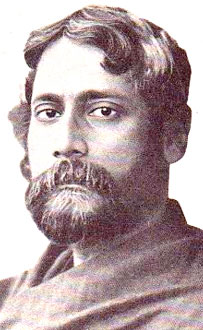
 • A one-day seminar to celebrate the 50th Anniversary of
• A one-day seminar to celebrate the 50th Anniversary of 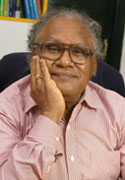 Invited speakers include Professor C.N.R. Rao (photo) from Jawaharlal Nehru Centre for Advanced Scientific Research in Bangalore, India, who will talk about ”Developing Countries in the International Year of Chemistry”; and Professor Hans Rosling, Karolinska Institutet, Stockholm, who will talk about ”ISP and the world”.
Invited speakers include Professor C.N.R. Rao (photo) from Jawaharlal Nehru Centre for Advanced Scientific Research in Bangalore, India, who will talk about ”Developing Countries in the International Year of Chemistry”; and Professor Hans Rosling, Karolinska Institutet, Stockholm, who will talk about ”ISP and the world”. 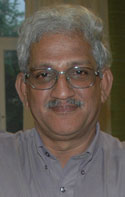 Professor
Venkatesh Athreya from the
Swaminathan Research Foundation in Chennai, India holds a SASNET lecture at Lund University on Tuesday 27 September 2011, 15.15–17.00. During the seminar, organised in collaboration with the
Professor
Venkatesh Athreya from the
Swaminathan Research Foundation in Chennai, India holds a SASNET lecture at Lund University on Tuesday 27 September 2011, 15.15–17.00. During the seminar, organised in collaboration with the  • A Global Poverty Consensus
Report Workshop will be held at the University of Oslo, Norway,
3–4 September 2011. Experts on the issue of poverty from all disciplines are invited to participate in the
conference, that is being organised by Academics Stand Against Poverty (ASAP), an international
• A Global Poverty Consensus
Report Workshop will be held at the University of Oslo, Norway,
3–4 September 2011. Experts on the issue of poverty from all disciplines are invited to participate in the
conference, that is being organised by Academics Stand Against Poverty (ASAP), an international • The Nordic Centre in India university consortium (
• The Nordic Centre in India university consortium ( • The 17th Himalayan Languages Symposium (HLS) will be held in Kobe, Japan, 6–9 September 2011. It is being hosted by Kobe City University of Foreign Studies, on behalf of the Forum for Scholars of Himalayan Languages. HLS is an annually convening, open scholarly forum for scholars of Himalayan languages. Contributions are welcome on any language of the greater Himalayan region, e.g. Burushaski, Kusunda, Tibeto-Burman, Indo-Iranian, Austroasiatic, Kradai, Andamanese, Nahali, Dravidian or any other language of the area. In addition to linguistic presentations, contribution are also welcome from related disciplines such as history, anthropology, archaeology and prehistory. The forum is secular and scholarly and not open to political or religious contributions.
• The 17th Himalayan Languages Symposium (HLS) will be held in Kobe, Japan, 6–9 September 2011. It is being hosted by Kobe City University of Foreign Studies, on behalf of the Forum for Scholars of Himalayan Languages. HLS is an annually convening, open scholarly forum for scholars of Himalayan languages. Contributions are welcome on any language of the greater Himalayan region, e.g. Burushaski, Kusunda, Tibeto-Burman, Indo-Iranian, Austroasiatic, Kradai, Andamanese, Nahali, Dravidian or any other language of the area. In addition to linguistic presentations, contribution are also welcome from related disciplines such as history, anthropology, archaeology and prehistory. The forum is secular and scholarly and not open to political or religious contributions. 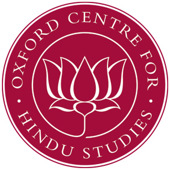 • Oxford Centre for Hindu Studies (OCHS) in the UK organises a conference entitled ”The Goddess: Understanding The Sakta Traditions” on 10–11 September 2011. The aim of conference is to address fundamental questions such as the clarification of the distinction between Saiva and Sakta traditions, questions about Sakta textual lineages and their interrelationship, the clarification of doctrines and practices of the different schools, questions about the relationship between the tantric and the puranic Goddess traditions, questions about the relationship between local Goddess traditions (such as the Teyyams in Kerala) and the pan-South Asian traditions, raising questions about the relationship between esoteric practices and the exoteric temple cults, asking what the delimitation of Sakta doctrine is, and what developments there are in contemporary Sakta worship. Speakers include Dr.
Marianne C. Qvortrup Fibiger, University of Aarhus, who will talk about Devi worship. Venue: Somerville College,
Woodstock Road,
Oxford.
• Oxford Centre for Hindu Studies (OCHS) in the UK organises a conference entitled ”The Goddess: Understanding The Sakta Traditions” on 10–11 September 2011. The aim of conference is to address fundamental questions such as the clarification of the distinction between Saiva and Sakta traditions, questions about Sakta textual lineages and their interrelationship, the clarification of doctrines and practices of the different schools, questions about the relationship between the tantric and the puranic Goddess traditions, questions about the relationship between local Goddess traditions (such as the Teyyams in Kerala) and the pan-South Asian traditions, raising questions about the relationship between esoteric practices and the exoteric temple cults, asking what the delimitation of Sakta doctrine is, and what developments there are in contemporary Sakta worship. Speakers include Dr.
Marianne C. Qvortrup Fibiger, University of Aarhus, who will talk about Devi worship. Venue: Somerville College,
Woodstock Road,
Oxford. 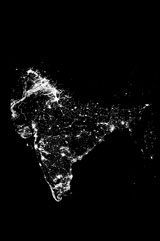 • The
• The 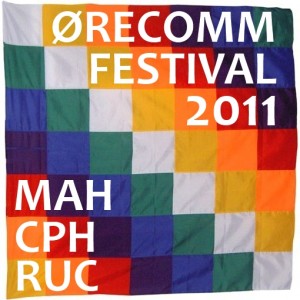 • ”Agency in the Mediatized World” is the overarching theme for the first Ørecomm Festival, 9–13 September 2011, a five-day event that brings an inspiring mix of seminars, lectures and conferences to Malmö, Copenhagen and Roskilde. The Ørecomm Festival, co-organised by the
• ”Agency in the Mediatized World” is the overarching theme for the first Ørecomm Festival, 9–13 September 2011, a five-day event that brings an inspiring mix of seminars, lectures and conferences to Malmö, Copenhagen and Roskilde. The Ørecomm Festival, co-organised by the 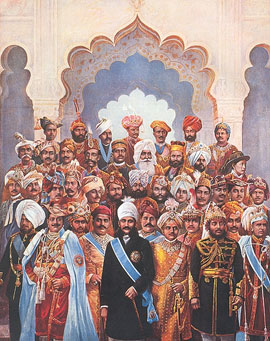 • A conference entitled ”Staging Empire – the 1911 Imperial durbar at
Delhi” will be held in Manchester, UK 15–16 September 2011. It is being organised by the Dept. of History, Manchester Metropolitan
University, and the German Historical Institute, London.
• A conference entitled ”Staging Empire – the 1911 Imperial durbar at
Delhi” will be held in Manchester, UK 15–16 September 2011. It is being organised by the Dept. of History, Manchester Metropolitan
University, and the German Historical Institute, London. 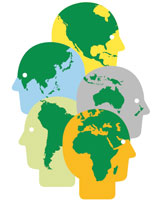 • The European Association of Development Research and Training Institutes (EADI) invites papers for its triennial 13th General Conference to be held 19–22 September 2011 in York, UK. The theme for the conference will be ”Rethinking Development
in an Age of Scarcity and Uncertainty.
New Values, Voices and Alliances for Increased Resilience”. It will be co-organised by the British Development Studies Association (DSA).
• The European Association of Development Research and Training Institutes (EADI) invites papers for its triennial 13th General Conference to be held 19–22 September 2011 in York, UK. The theme for the conference will be ”Rethinking Development
in an Age of Scarcity and Uncertainty.
New Values, Voices and Alliances for Increased Resilience”. It will be co-organised by the British Development Studies Association (DSA).  • The Danish Institute for International Studies (DIIS) and the Centre for Advanced Security Theory (CAST) at the University of Copenhagen jointly organizes an international conference entitled ”Ten Years after 9/11: What did We Learn about Religion?”, on 22-23 September 2011. Among the invited speakers are Shehryar Fazli, Senior Analyst, International Crisis Group, Islamabad, Pakistan, who participates in a panel on ”Religious Terrorism Post 9/11 – Lessons and Future Perspectives”; and Rahimullah Yusufzai, Bureau Chief, The News International, Peshawar, Pakistan, who participates in a panel on ”What does Religion have to do with Taliban and Al-Qaida?”
• The Danish Institute for International Studies (DIIS) and the Centre for Advanced Security Theory (CAST) at the University of Copenhagen jointly organizes an international conference entitled ”Ten Years after 9/11: What did We Learn about Religion?”, on 22-23 September 2011. Among the invited speakers are Shehryar Fazli, Senior Analyst, International Crisis Group, Islamabad, Pakistan, who participates in a panel on ”Religious Terrorism Post 9/11 – Lessons and Future Perspectives”; and Rahimullah Yusufzai, Bureau Chief, The News International, Peshawar, Pakistan, who participates in a panel on ”What does Religion have to do with Taliban and Al-Qaida?”  • An International conference entitled ”Globalization and Public Sector Reforms in India and China” will be held in Copenhagen on 23–24 September 2011. The conference is organized by Kjeld Erik Brødsgaard and Anthony P. D’Costa at the Asia Research Centre, Copenhagen Business School (CBS). It is a follow-up to the December 2009 conference on “Globalization and Economic Nationalism in Asia”. The Asia Research Centre now revisits the role of the state, but in a different way. The objective is to firmly grasp the central issues surrounding public sector reform in India and China. The conference calls for empirical papers that are theoretically grounded and directly address the significance of public sector reforms in China and India in the wider political, economic, and social contexts. The organisers also welcome well-positioned industry, sectoral, technological, and national-comparative analysis of public sector reforms. Registration deadline is
15 September 2011.
• An International conference entitled ”Globalization and Public Sector Reforms in India and China” will be held in Copenhagen on 23–24 September 2011. The conference is organized by Kjeld Erik Brødsgaard and Anthony P. D’Costa at the Asia Research Centre, Copenhagen Business School (CBS). It is a follow-up to the December 2009 conference on “Globalization and Economic Nationalism in Asia”. The Asia Research Centre now revisits the role of the state, but in a different way. The objective is to firmly grasp the central issues surrounding public sector reform in India and China. The conference calls for empirical papers that are theoretically grounded and directly address the significance of public sector reforms in China and India in the wider political, economic, and social contexts. The organisers also welcome well-positioned industry, sectoral, technological, and national-comparative analysis of public sector reforms. Registration deadline is
15 September 2011. • The South Asia Research and Information Institute (
• The South Asia Research and Information Institute ( • An International Conference on Post-Independence Hindi Literature will be held in Ghent, Belgium, 3–5 October 2011. The theme for the conference is ”'Indianness' in Nayi Kavita (New Poetry) and the Hindi Novel”. These genres, originating in the late pre-Independence period (1940s), developed in the decades following India’s Independence and are thought to mirror the broader prevailing postcolonial societal issues, especially mohbhang (‘disenchantment’ after decades of optimism and hope for the new India), as well as India’s engagement with global concerns (World War II, Marxism, etc.).
The conference
is organised by the Dept. of Languages and Cultures of South and East Asia at University of Ghent.
• An International Conference on Post-Independence Hindi Literature will be held in Ghent, Belgium, 3–5 October 2011. The theme for the conference is ”'Indianness' in Nayi Kavita (New Poetry) and the Hindi Novel”. These genres, originating in the late pre-Independence period (1940s), developed in the decades following India’s Independence and are thought to mirror the broader prevailing postcolonial societal issues, especially mohbhang (‘disenchantment’ after decades of optimism and hope for the new India), as well as India’s engagement with global concerns (World War II, Marxism, etc.).
The conference
is organised by the Dept. of Languages and Cultures of South and East Asia at University of Ghent. 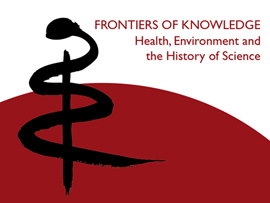 • The third Annual Conference of the Cluster of Excellence ”Asia and Europe in a Global Context” will be held at Heidelberg University, Germany, 5–7 October 2011. This year’s topic is ”Frontiers of Knowledge: Health, Environment and the History of Science”. The conference presents the ongoing research results of the Cluster’s Research Area C ”Health and Environment” in collaboration with renowned scholars from around the globe. Together they will examine and discuss transcultural issues in these fields transgressing the conventional intellectual divisions between Asia and Europe.
• The third Annual Conference of the Cluster of Excellence ”Asia and Europe in a Global Context” will be held at Heidelberg University, Germany, 5–7 October 2011. This year’s topic is ”Frontiers of Knowledge: Health, Environment and the History of Science”. The conference presents the ongoing research results of the Cluster’s Research Area C ”Health and Environment” in collaboration with renowned scholars from around the globe. Together they will examine and discuss transcultural issues in these fields transgressing the conventional intellectual divisions between Asia and Europe. • The Norwegian University of Science and Technology (NTNU) in Trondheim organises a conference entitled ”Banaras Revisited: Scholarly Pilgrimages to the City of Light” on 7–8 October 2011. It is part of NTNU’s big India – NTNU 2011 event (
• The Norwegian University of Science and Technology (NTNU) in Trondheim organises a conference entitled ”Banaras Revisited: Scholarly Pilgrimages to the City of Light” on 7–8 October 2011. It is part of NTNU’s big India – NTNU 2011 event (